

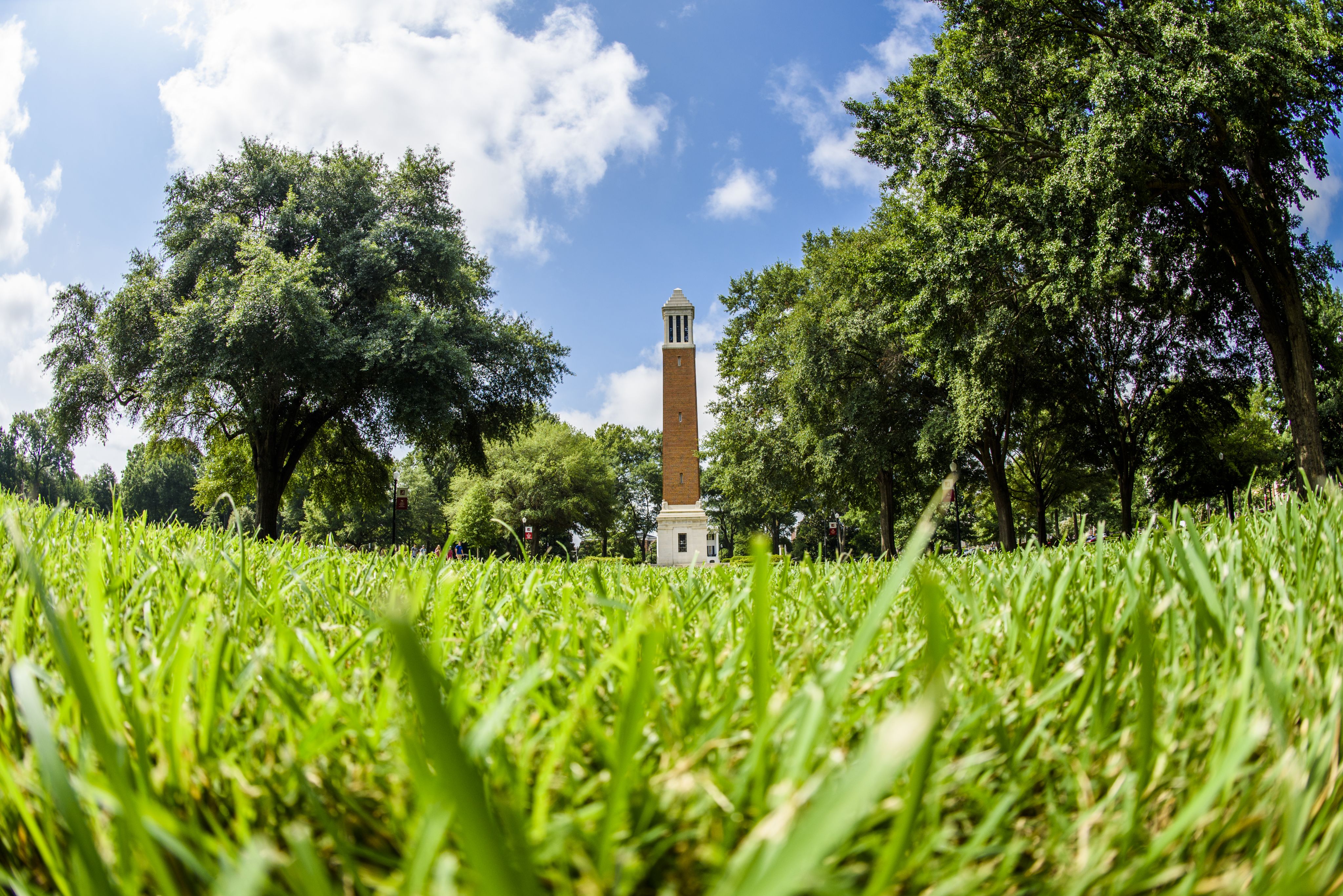
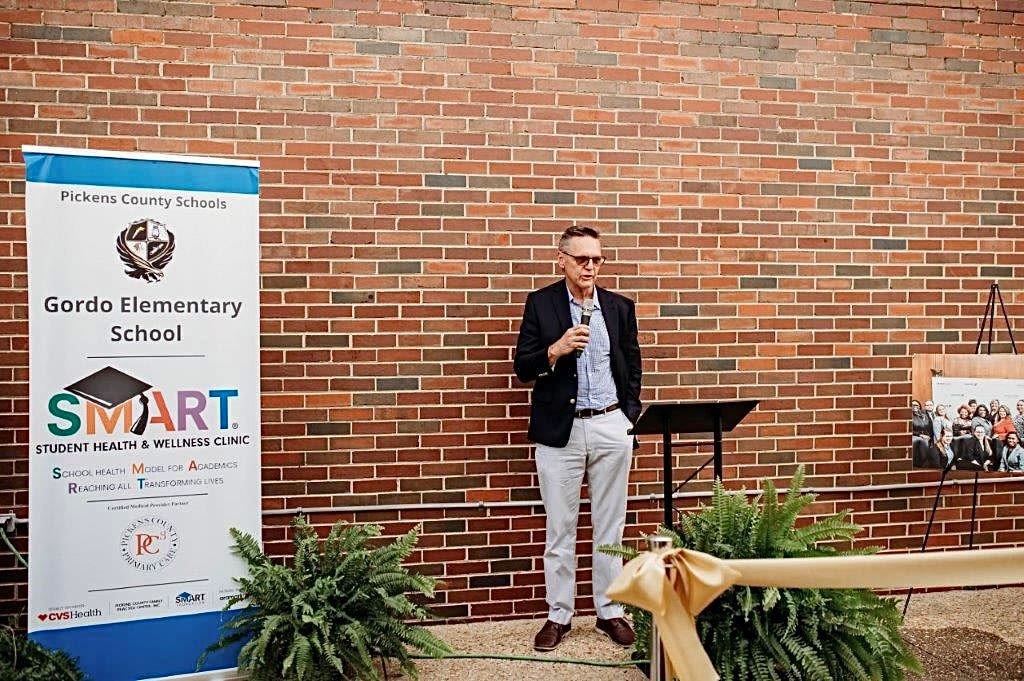
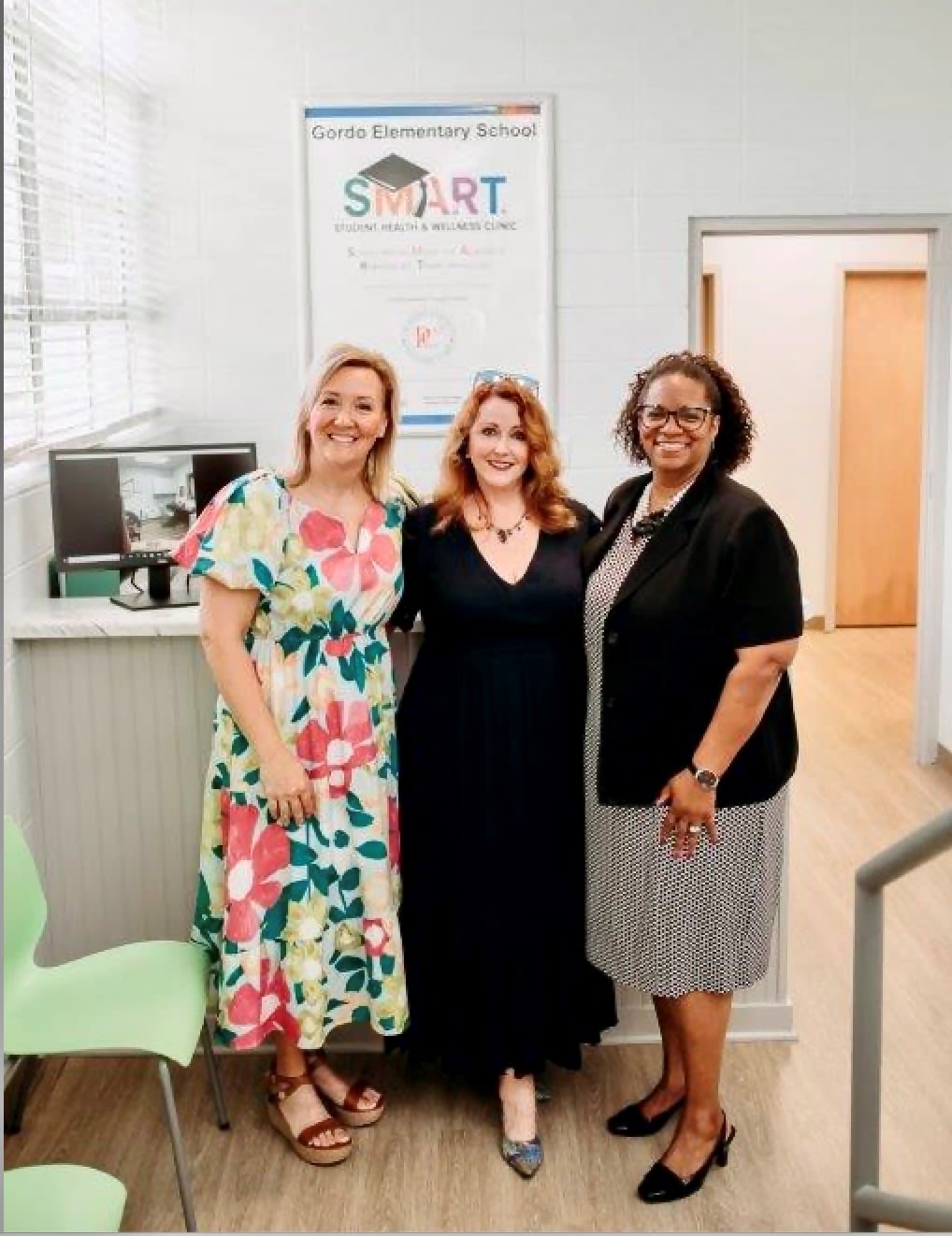
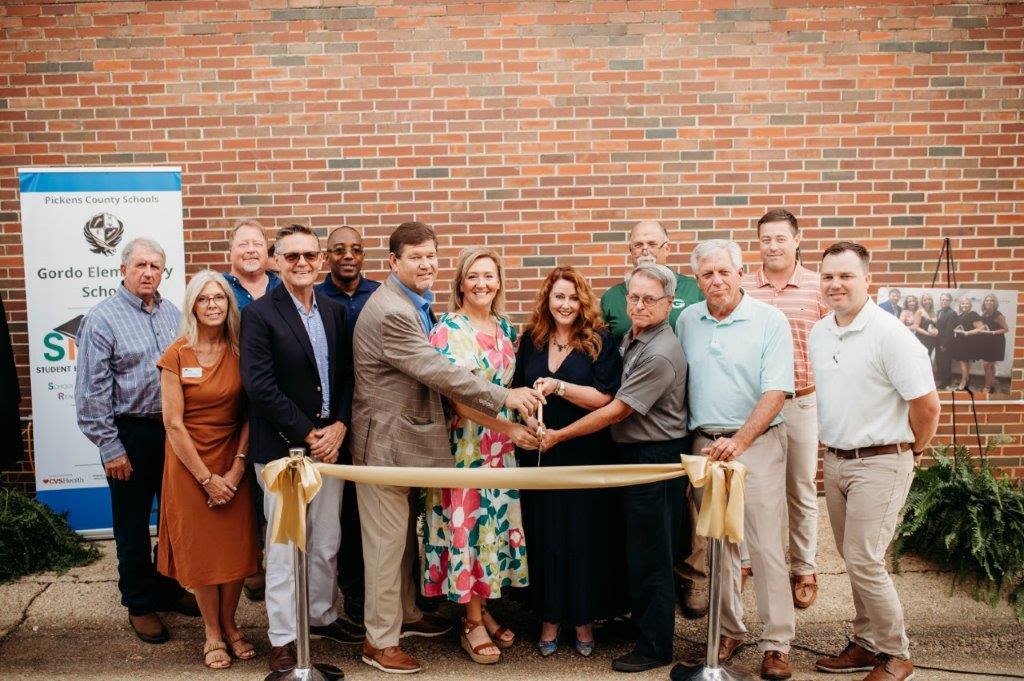
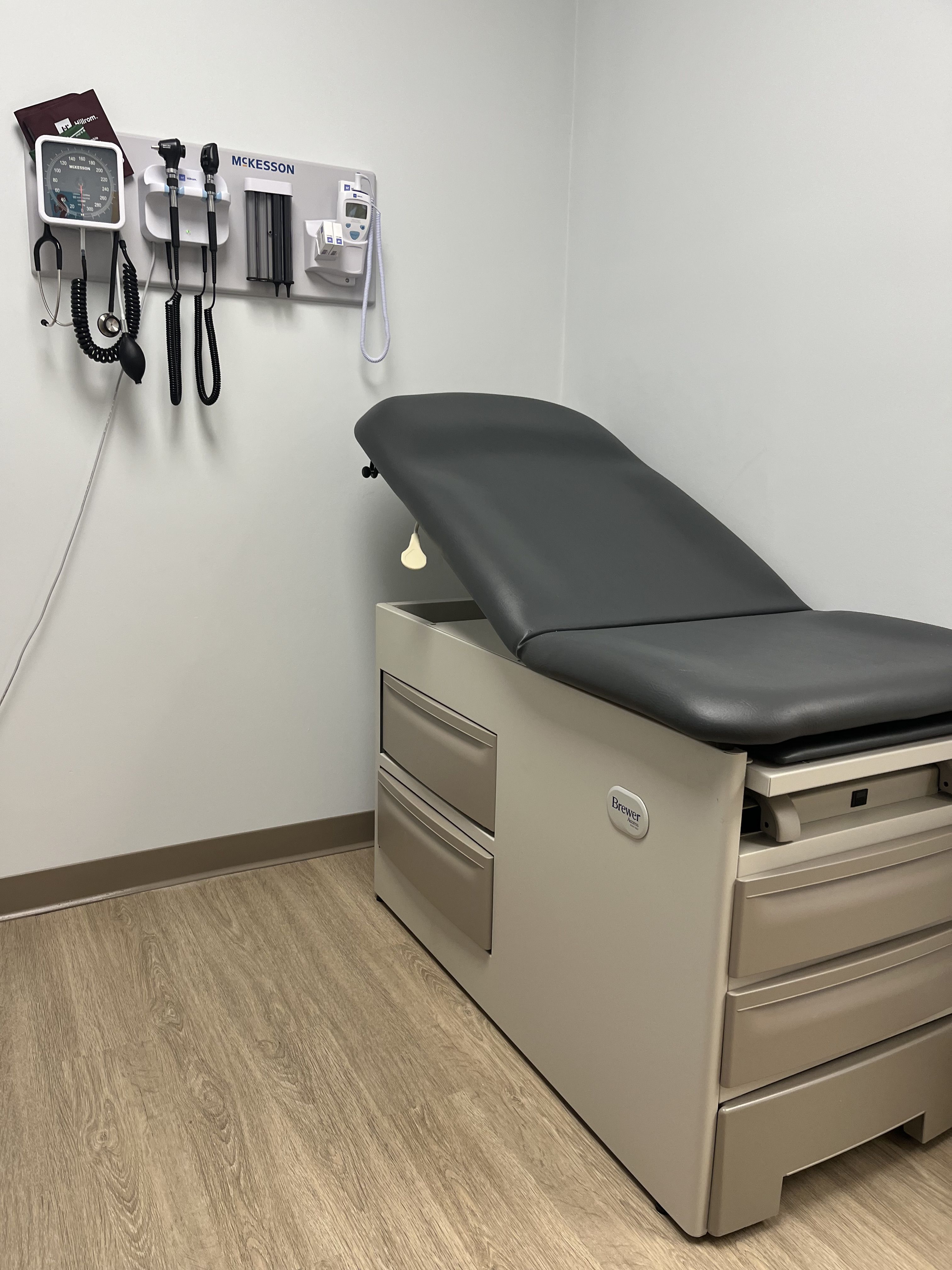
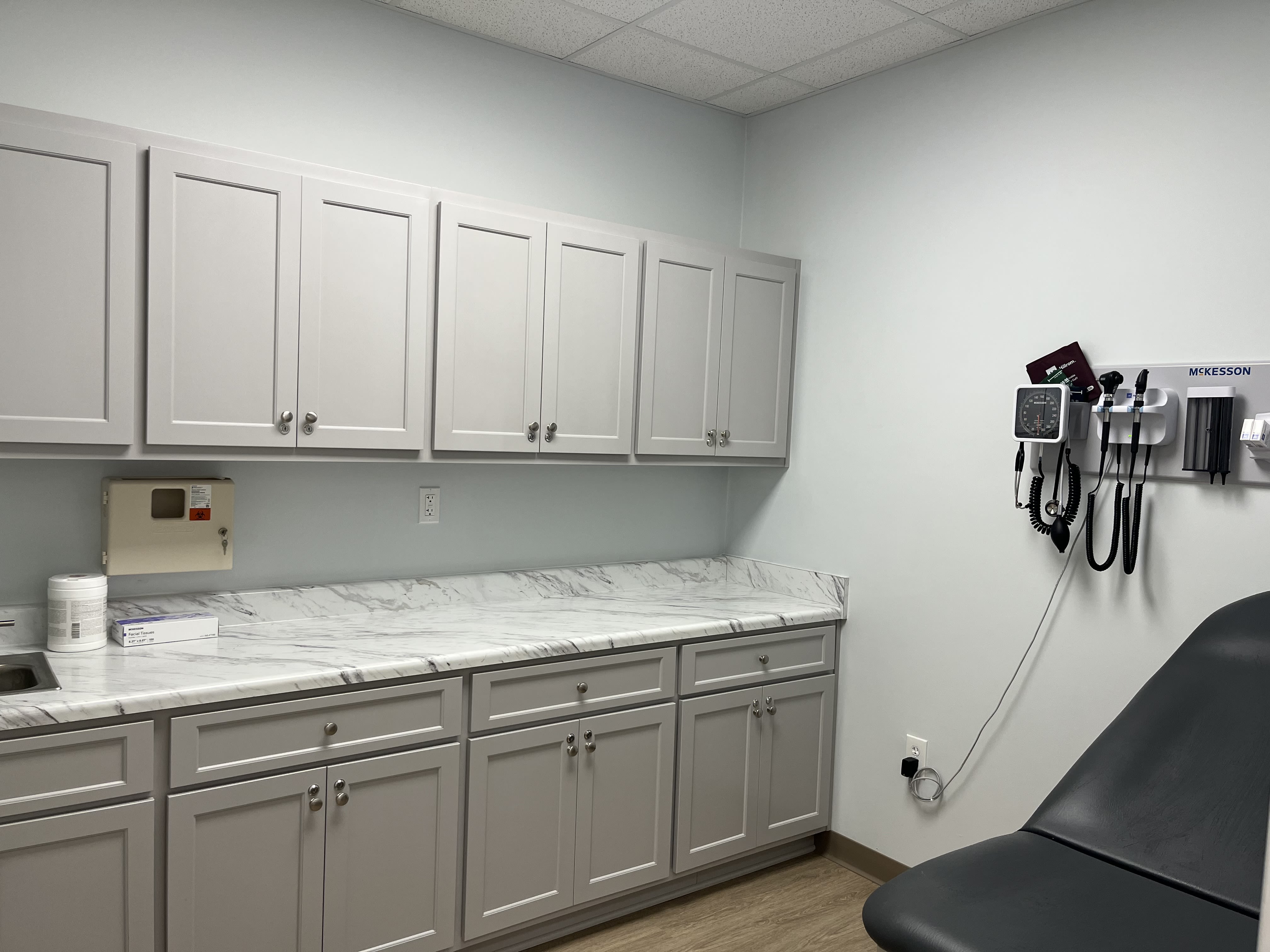
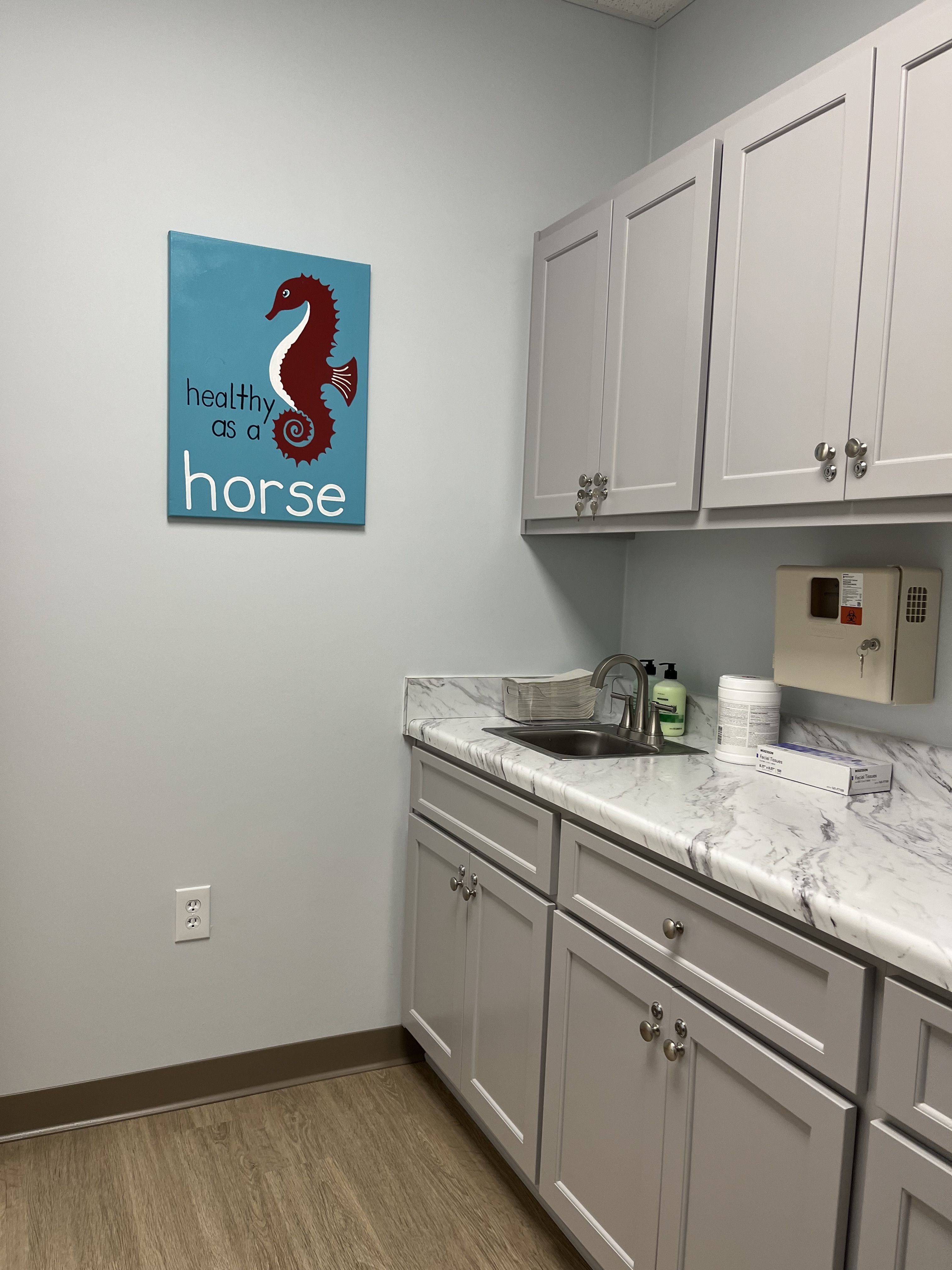
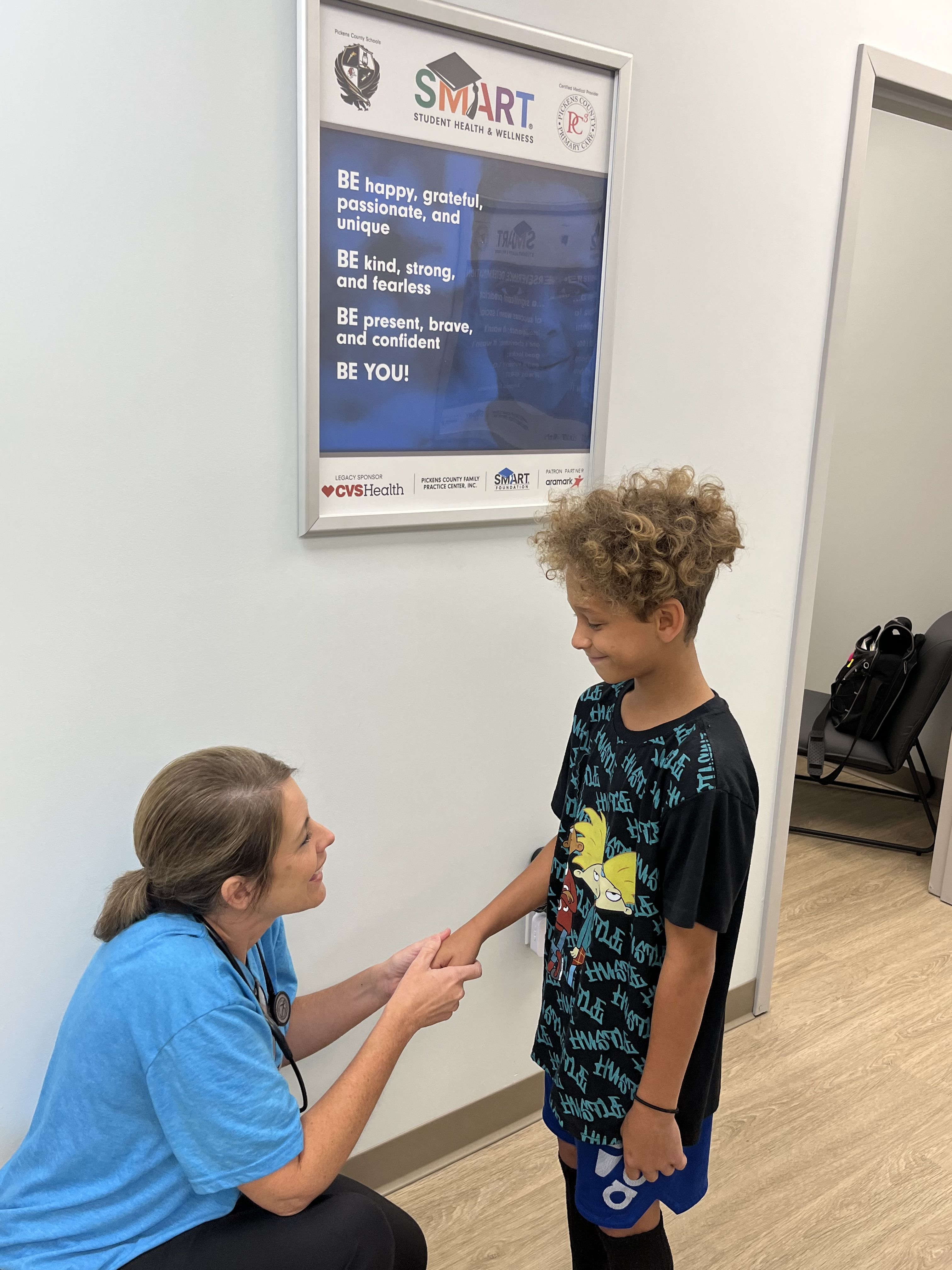
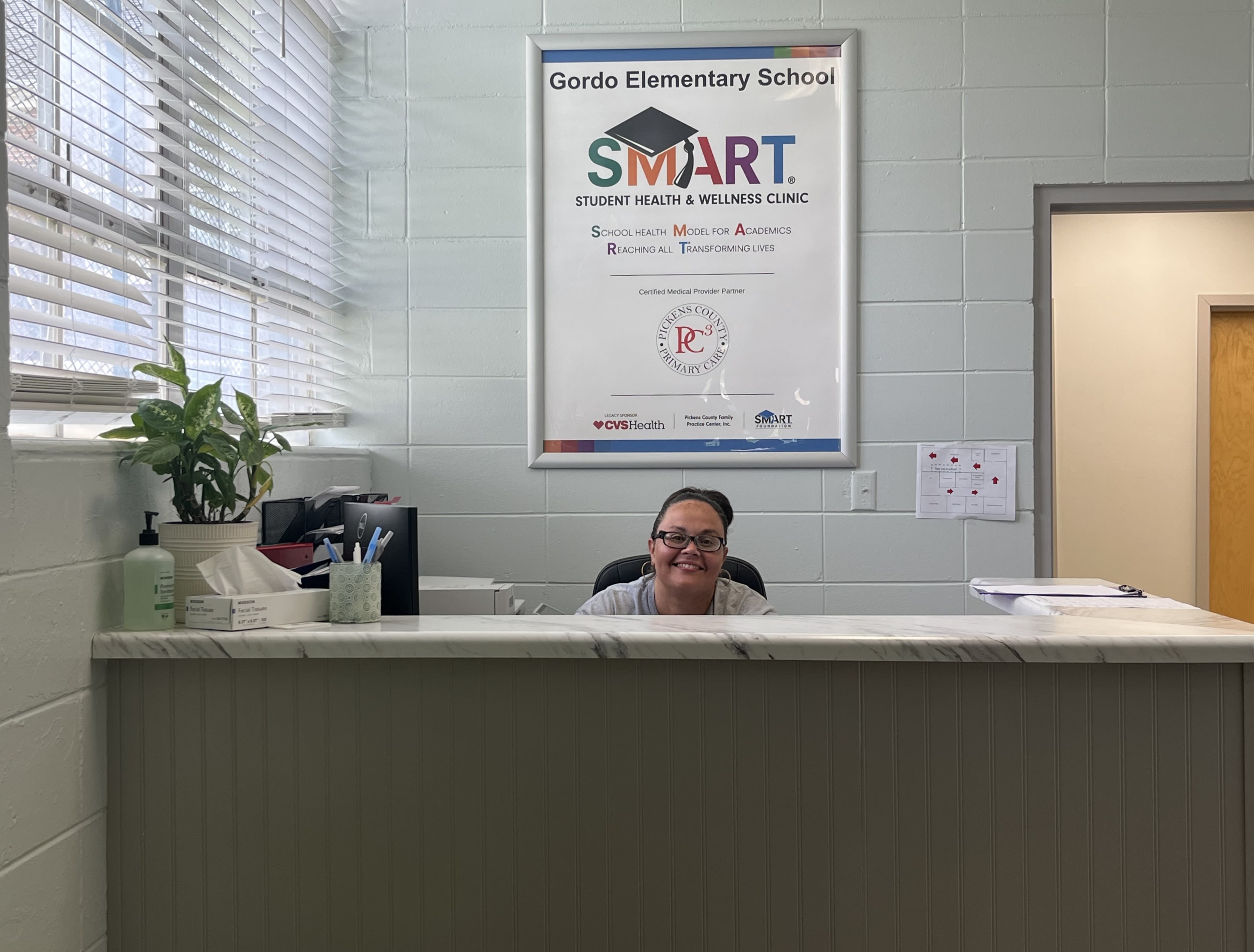
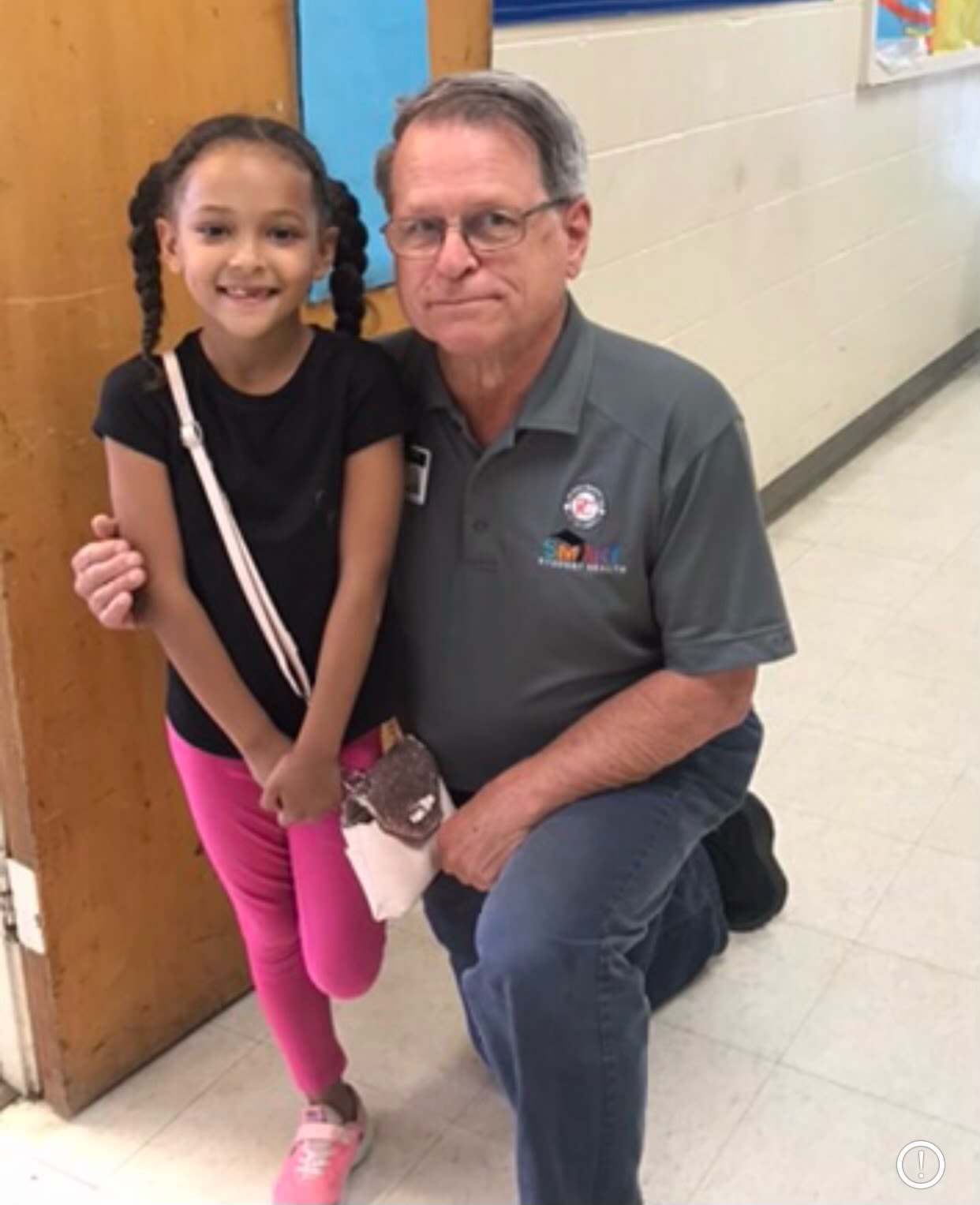

Former Dean of the College of Education Dr. Peter Hlebowitsh speaks at the SMART Clinic dedication and ribbon-cutting ceremony.
Former Dean of the College of Education Dr. Peter Hlebowitsh speaks at the SMART Clinic dedication and ribbon-cutting ceremony.

From left, Julia L. Boothe, MD, MPH, FFAFP, Founder of Pickens County Primary Care and Medical Provider Partner for SMART Student Health Clinics in Pickens County; Melanie Ginn, Architect of the SMART® Model and President, CEO, and Founder of Ginn Group Collaborative, LLC; and Renita Quick, Chief of Staff, Ginn Group Collaborative.
From left, Julia L. Boothe, MD, MPH, FFAFP, Founder of Pickens County Primary Care and Medical Provider Partner for SMART Student Health Clinics in Pickens County; Melanie Ginn, Architect of the SMART® Model and President, CEO, and Founder of Ginn Group Collaborative, LLC; and Renita Quick, Chief of Staff, Ginn Group Collaborative.

Group poses for a photo during the ribbon-cutting ceremony.
Group poses for a photo during the ribbon-cutting ceremony.






SMART® physician John Brandon, MD, takes a photo with a student.
SMART® physician John Brandon, MD, takes a photo with a student.
New SMART Clinic at Gordo Elementary serves wellness, academic needs of students
As students filled the classrooms of Gordo Elementary, ready to start another year of learning, the staff of the school’s new medical clinic was prepared for a busy school year as well.
The Gordo Elementary School SMART® Student Health and Wellness Clinic (SMART® Clinic) celebrated its spring opening last month with a dedication and ribbon-cutting ceremony held outside of the school. After the dedication, attendees were able to tour the 1,500-square-foot clinic that includes two exam rooms, two behavioral health rooms, and a full-service CLIA-waived laboratory as well as reception and meeting areas.
The Gordo Elementary location is the second SMART® Clinic in the community and the fifth in Pickens County, with its first facilities opening their doors in 2018. Each clinic’s opening was made possible by design management firm Ginn Group Collaborative (GGC) and Legacy Sponsor CVS Health. SMART® partners Pickens County Primary Care (PC3), founded by Julia Lett Boothe, MD; SMART® physician John Brandon, MD; and Pickens County Schools also played important parts in this effort, as have stakeholders including The University of Alabama, former College of Education Dean Dr. Peter Hlebowitsh, and UA Office of Evaluation Director Dr. Karl Hamner.
All five SMART® Clinics are staffed with dedicated family physicians and nurse practitioners from SMART® medical provider partner PC3 as well as certified social workers, who offer behavior health services and counseling to students, teachers, and faculty in the schools. Students in the UA School of Social Work also assist in the clinics as they complete their internship placements.
“(SMART® provides) a level of top proactive population health care that is unmatched anywhere,” said Melanie Shaw Ginn, Architect of the SMART® Student Health and Wellness Model and President, CEO, and Founder of GGC. “No one else is going into a school population, consenting the entire building, and screening and risk stratifying students to see their health risks, not just for the sake of health but the risks to (their) academic achievement.”
SMART® stands for School Health Model for Academics Reaching All Transforming Lives, and all SMART® Clinics operate with the mission of providing every student enrolled at the schools by applying physical, behavioral, social, and emotional school-based interventions that help them thrive on all levels. These interventions are part of the SMART® Health and Wellness Model, which is specifically designed to work with and be integrated in schools that follow the “Whole Child 360” approach.
“‘We believe in putting students first.’ That’s our motto. Everything we do is about what is best for students,” Ginn said.
Ginn developed the SMART® Model in 2013 after being asked to evaluate and assist a struggling Chicago high school with a failed school-based health clinic. She used her business expertise and findings to create an innovative and self-sustaining infrastructure that provides students with comprehensive medical care and uses data-driven strategies proven to enhance classroom learning capabilities. The very first SMART® Clinic, which opened at Sullivan High School in Chicago, is currently in its 10th year of operation.
“The (SMART®) Model, the approach, the elements, what we do – we know it works,” Ginn said. “We get results that no one else is seeing consistently, whether urban, suburban, or rural.”
With SMART® Clinics being housed inside the schools, medical staff have continued access to students, teachers, and faculty and are able to diagnose and treat issues as promptly as possible. The on-site CLIA-waived laboratories also allow rapid tests, such as strep and COVID, as well as urinalysis to be run on site, in addition to blood draws that are sent out for analysis. This functionality aims to decrease the amount of time students, or teachers, spend outside of the classroom and the effect this can have on a child’s education.
“We have better outcomes, faster diagnosis and treatment, better follow-up, and a more proactive approach that all results in less lost classroom time, which is our goal. That’s what really differentiates SMART®,” Ginn said.
Ginn mentioned a case from a SMART® Clinic in Alabama involving a student who was suspected to be exhibiting symptoms of whooping cough. When the physicians closely examined the issue, they realized that the 7-year-old’s symptoms were ongoing, and they had been diagnosed previously with chronic bronchitis. However, nothing was adding up. Upon further examination by the SMART® Family Nurse Practitioner and conversations with the girl’s teacher, mother, and grandmother, it was revealed that due to numerous variables, the student had been experiencing acid reflux, which severely damaged her esophageal passage and was making her cough.
“The underlying theme is that she had been to several doctors who had maybe minutes to examine her and then said, ‘Oh, it’s chronic bronchitis.’ But how much class was missed (because of that)? How much learning has been lost?” Ginn said. “We were able to untangle something that has been affecting that child for two years in about an hour, an hour and a half or less.”
Just six months after the Pickens County SMART® Clinics opened, Reform Elementary School and Pickens County High School showed an improvement in student attendance. Absenteeism dropped by 55% at Reform Elementary and 28% at Pickens County High.
“Seeing these successes and a myriad of others in response to the county’s clinics has been such a rewarding experience,” Ginn said.
“It is a privilege and an honor. The people there have so much heart and care about their children. The way they have embraced this has been so moving to all of us. It inspires us to figure out how to do more and how to be able to open, as we have done, more clinics,” she said.
The UA College of Education’s Dr. Hlebowitsh and Dr. Hamner have long supported the SMART® Health and Wellness Model and recognized its positive effects, believing the Model should be institutionalized and “as normative within public education as cafeterias – one in every school,” as Dr. Hlebowitsh has said. Both educators played key roles in bringing SMART® to Alabama by inviting Ginn to visit and discuss the Model as well as contacting and talking with others in leadership positions at the University and beyond to express their faith in the SMART® Model and its impact on education.
“The SMART® Clinic is an example of the kind of partnerships that universities across the nation should develop,” said Dr. Hamner, who specializes in social science and health research. “(SMART®) helps communities to be healthy and is improving kids’ school performances and academic achievements. … It’s an amazing Model. There is no doubt that if people are willing to innovate, the SMART® Model can make a great difference.”
Dr. Hamner also believes SMART® should be expanded across Alabama, as it helps prevent and reduce issues with absences and discipline, and it improves the physical health, mental health, and overall well-being of students. These effects fan out and benefit the communities surrounding the schools as well.
“I can’t think of a better environment than a school with a SMART® Clinic in it,” he said.
“Both Dr. Hlebowitsh and Dr. Hamner have been tireless champions of the SMART® Model since the beginning,” Ginn said. “I'm very grateful to The University of Alabama, especially to Dr. Hlebowitsh and Dr. Hamner because they understand how critical this is in education in terms of taking a long view,” she said. “The School of Social Work has also been very involved in terms of rotating in. We're the number-one placement for their social workers, and we utilize them for their internships. They've been an integral part (of SMART®), so UA has been a great partner to us.”
The openings of the Pickens County clinics highlight SMART®’s focus on rural communities where people may not be able to afford or have limited access to health care – an issue that worsened for Pickens County at the height of the COVID-19 pandemic. In March 2020, the Pickens County Medical Center shut down, meaning that the nearest urgent care facilities are more than 30 miles away in Tuscaloosa or in Mississippi. SMART® and PC3 were on the frontlines for the entire community during the pandemic with mobilized checkups, COVID testing, and treatment as well as telehealth appointments.
“(The SMART® Clinics) stayed open during COVID-19,” Ginn said. “They were it for the whole county. It was incredible. Dr. Boothe showed unfaltering commitment to the community, and her SMART® Clinics stayed open.”
Over the past 10 years, SMART® has become nationally recognized and has successfully integrated SMART® Student Health and Wellness Clinics into 15 schools in the U.S., and the goal is for the Model to continue to expand its reach in the future, offering services to schools and communities in need.
“We are really continuing to focus on what type of environment Is fertile ground and what type of educational leadership is going to welcome the impact,” Ginn said. “We are about going where people are ‘students-first.’”
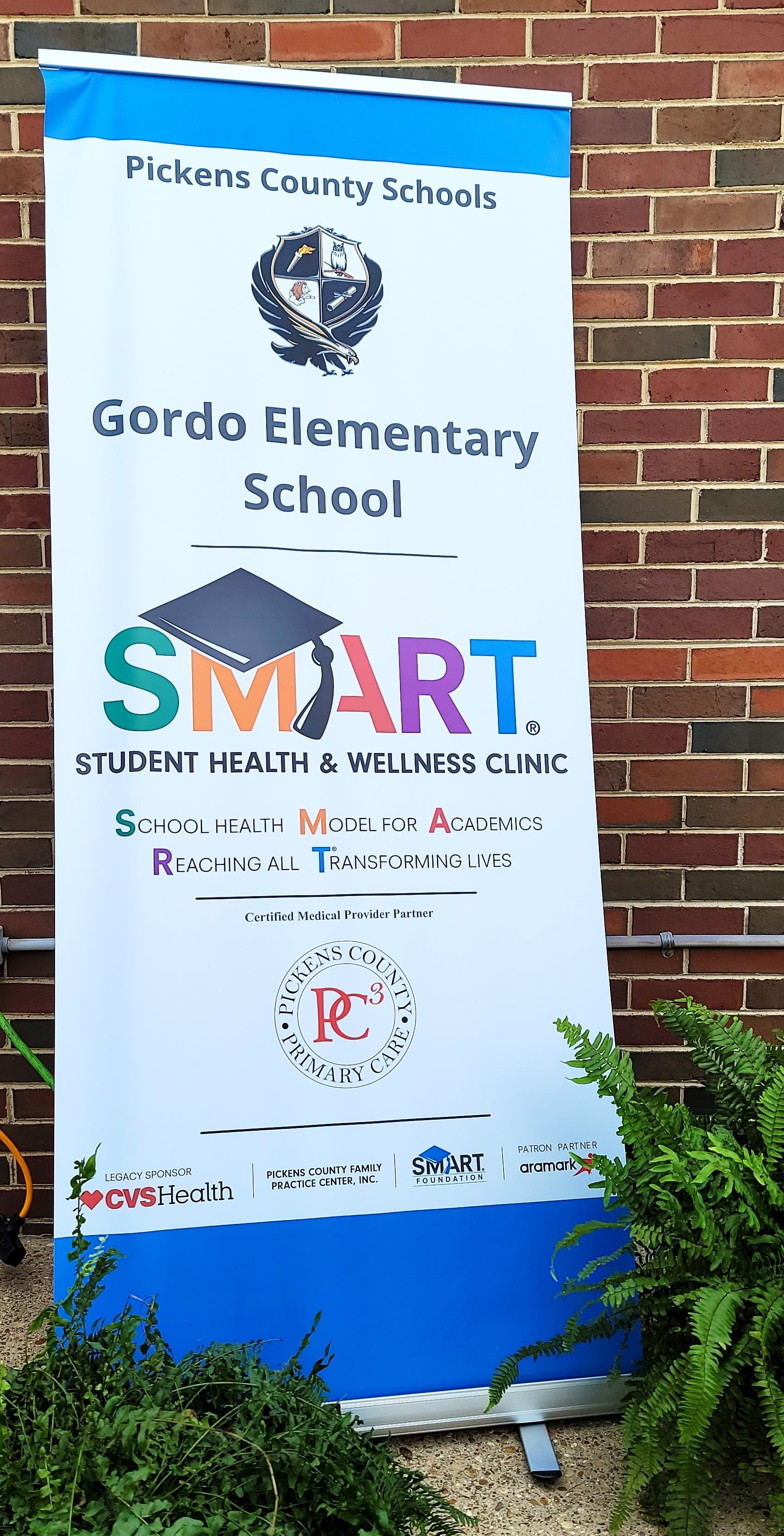
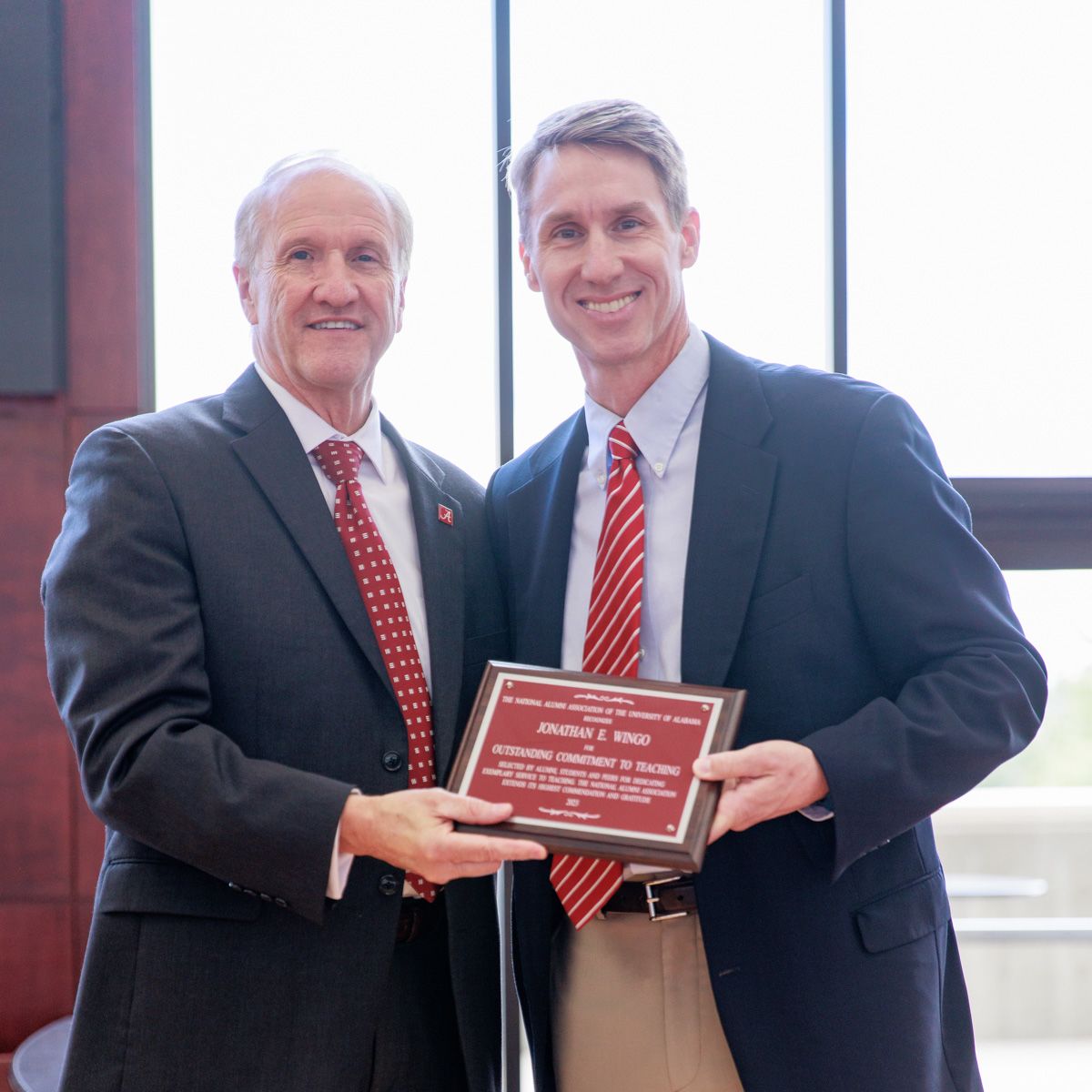
Dr. Jonathan Wingo named 2023 Outstanding Commitment to Teaching Award recipient
The College of Education’s own Dr. Jonathan Wingo was named a recipient of The University of Alabama National Alumni Association 2023 Outstanding Commitment to Teaching Award for his excellence as an educator.
These awards are a testament to faculty members’ dedication to teaching as well as the impact they have on their students. Recipients are nominated by alumni, faculty, and students, with a selection committee comprised of the same. Honorees receive a plaque and cash stipend and will accept their awards at the Fall General Faculty Meeting.
Dr. Wingo specializes in exercise physiology and currently serves as head of the Department of Kinesiology, exercise science professor, and director of the Exercise Physiology Laboratory. His research interests include performance optimization along with human cardiovascular and thermoregulatory responses during exercise in hot ambient conditions.
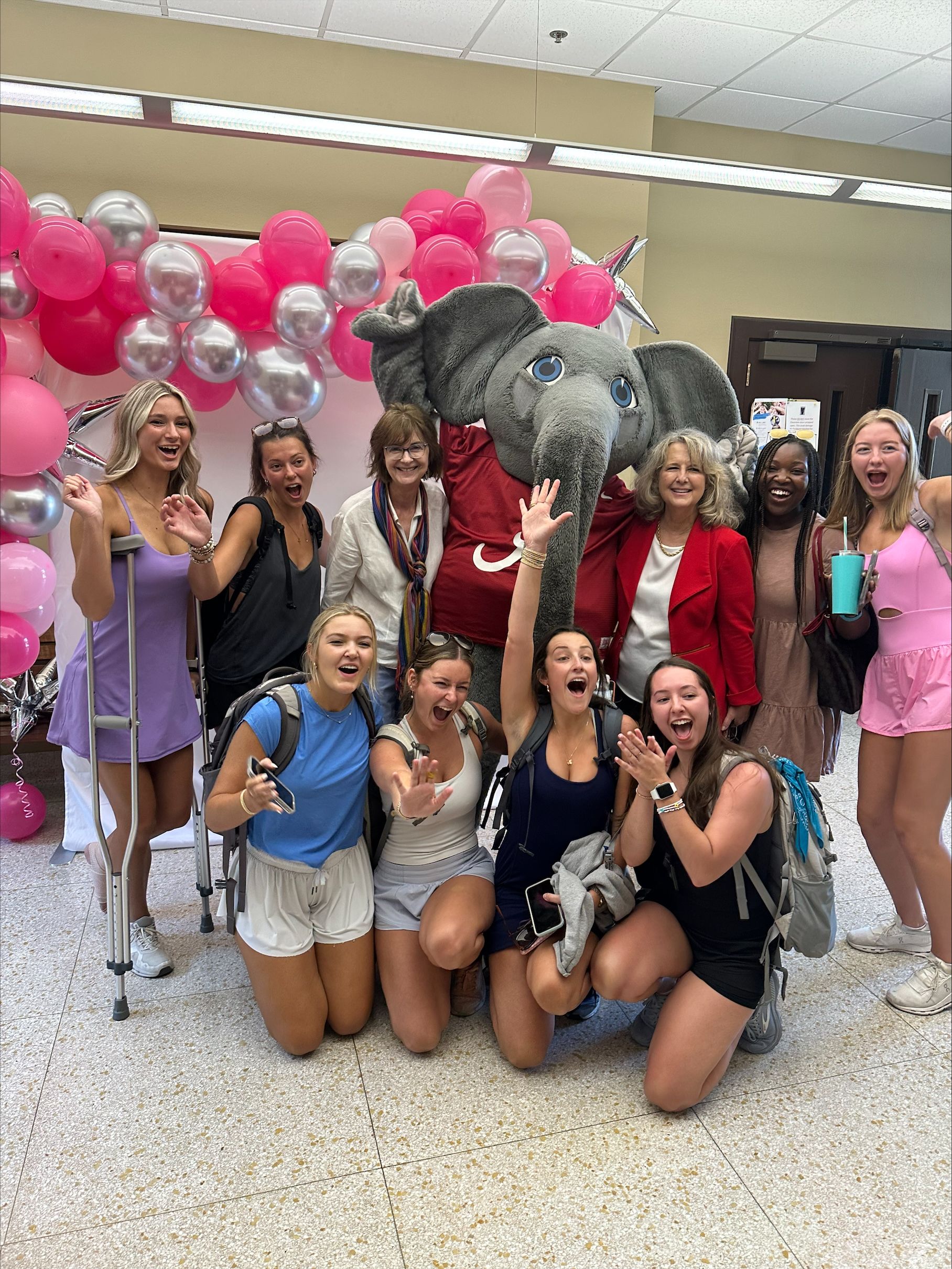
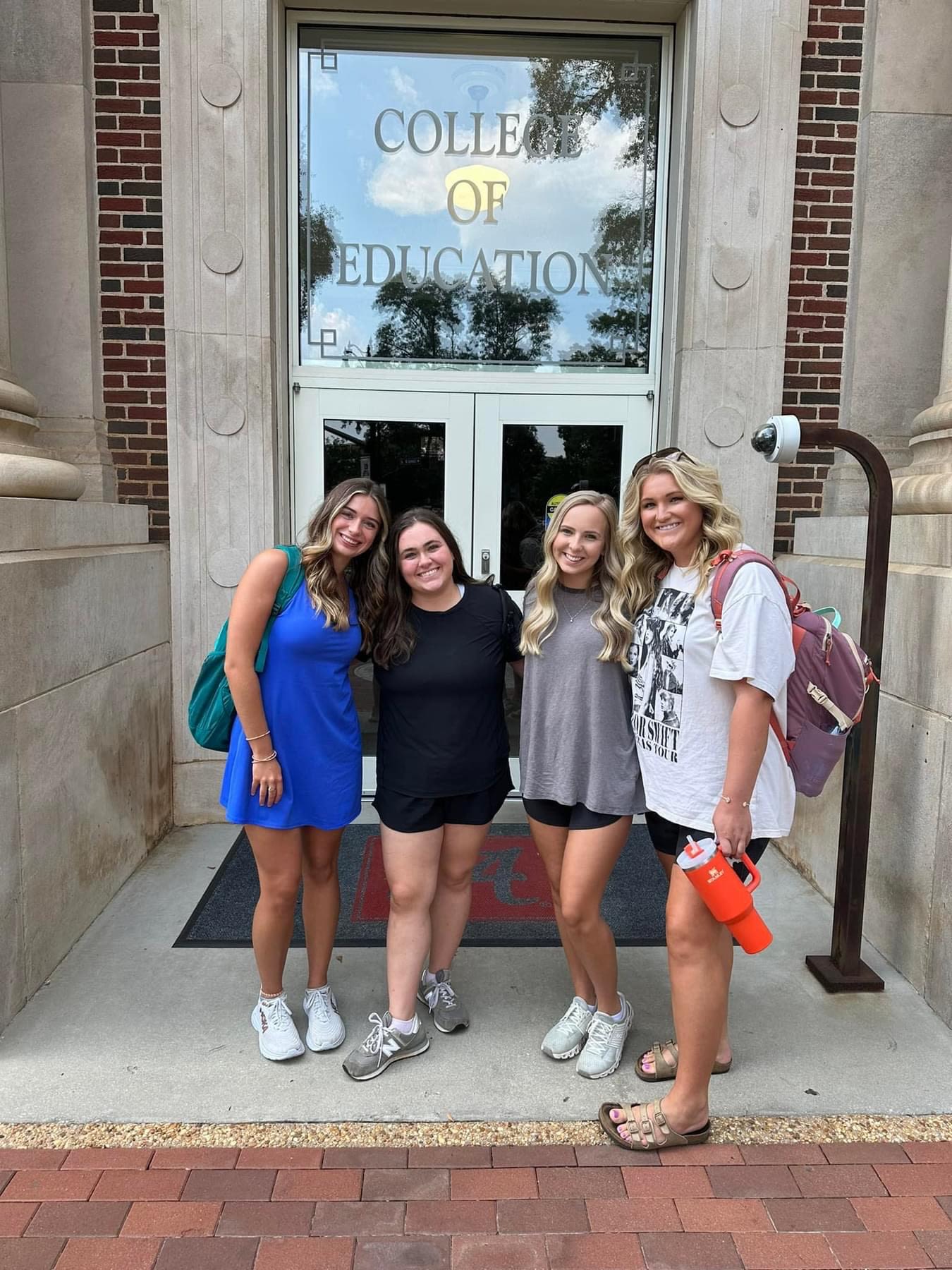
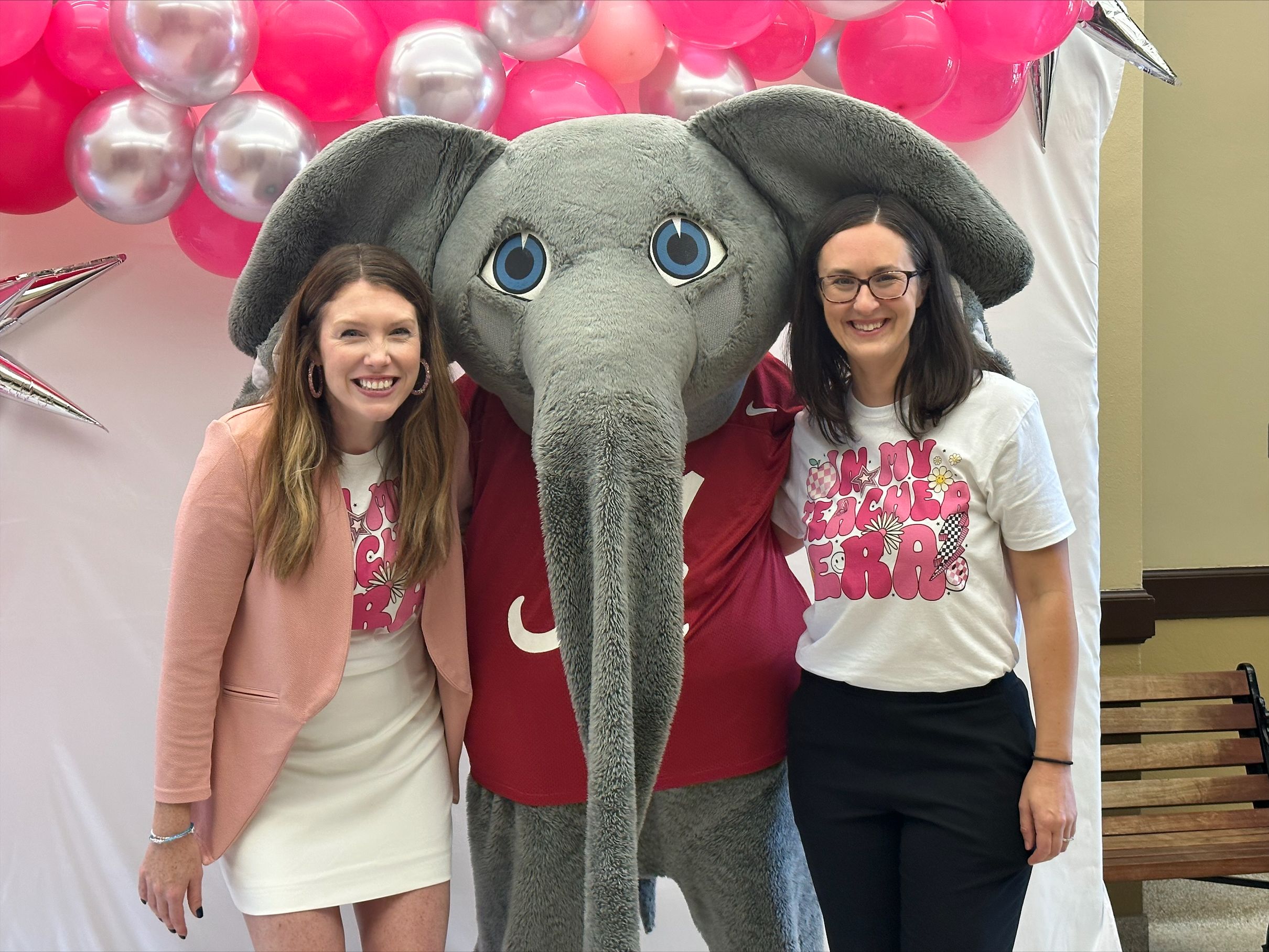
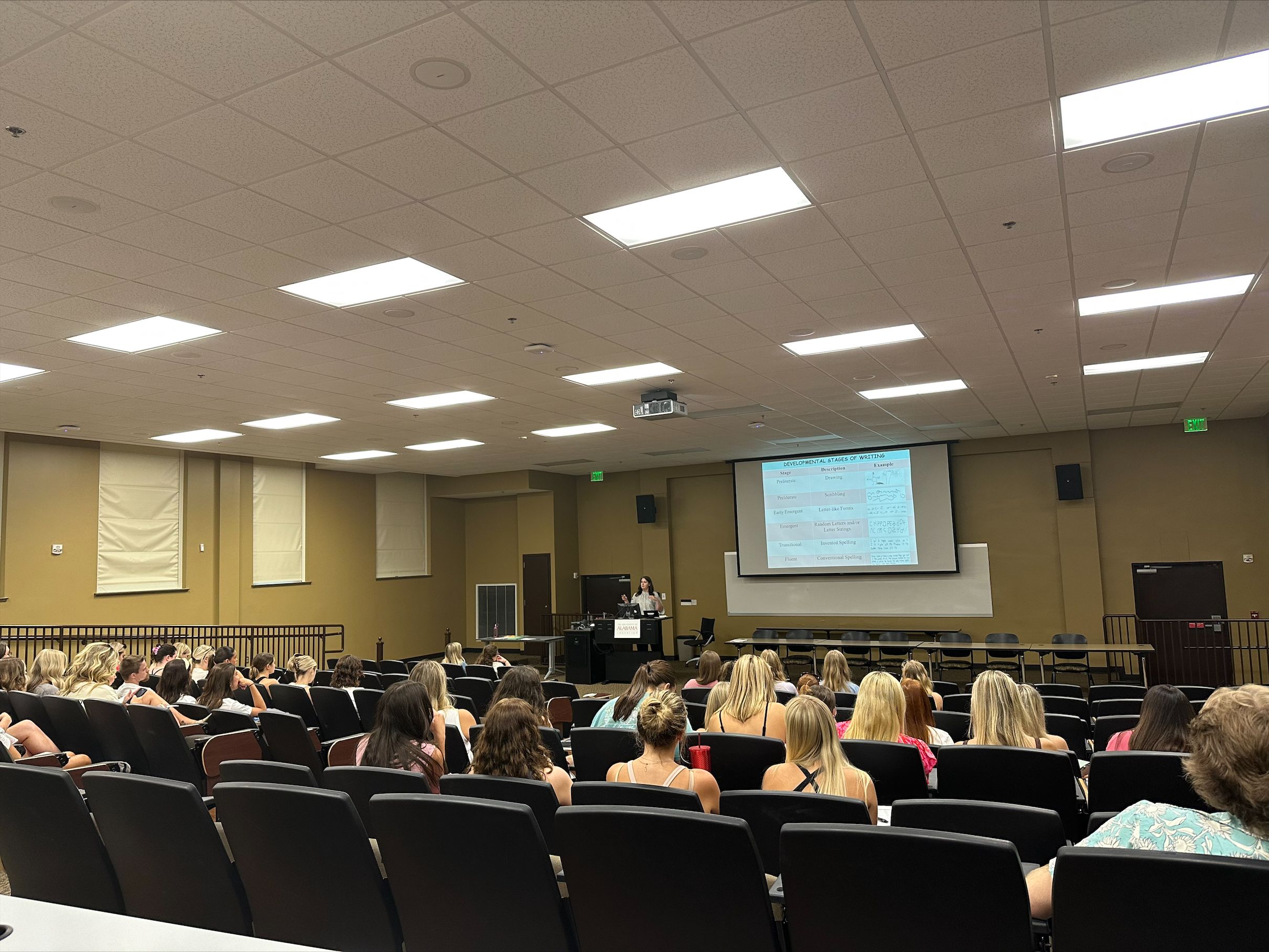
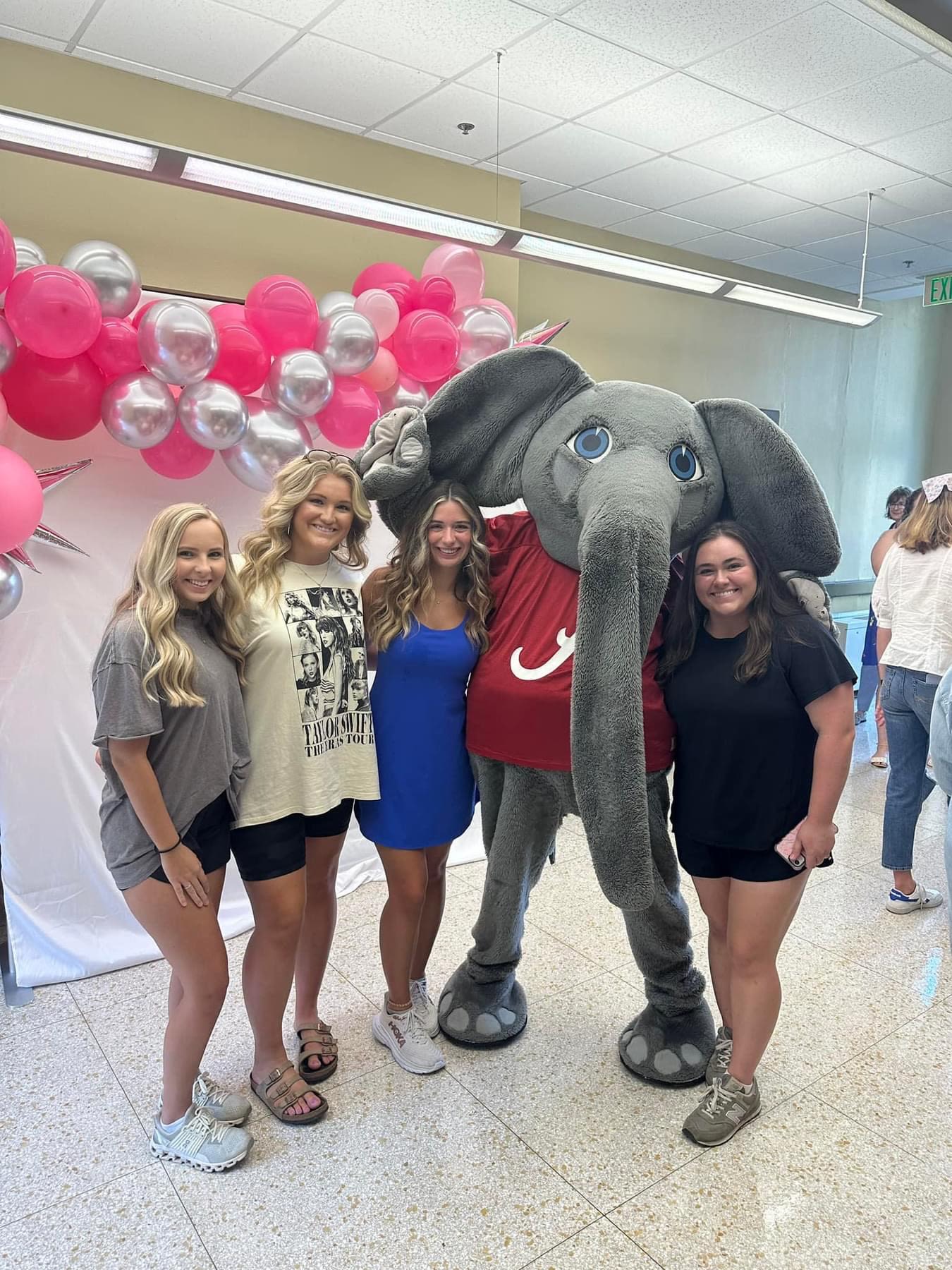
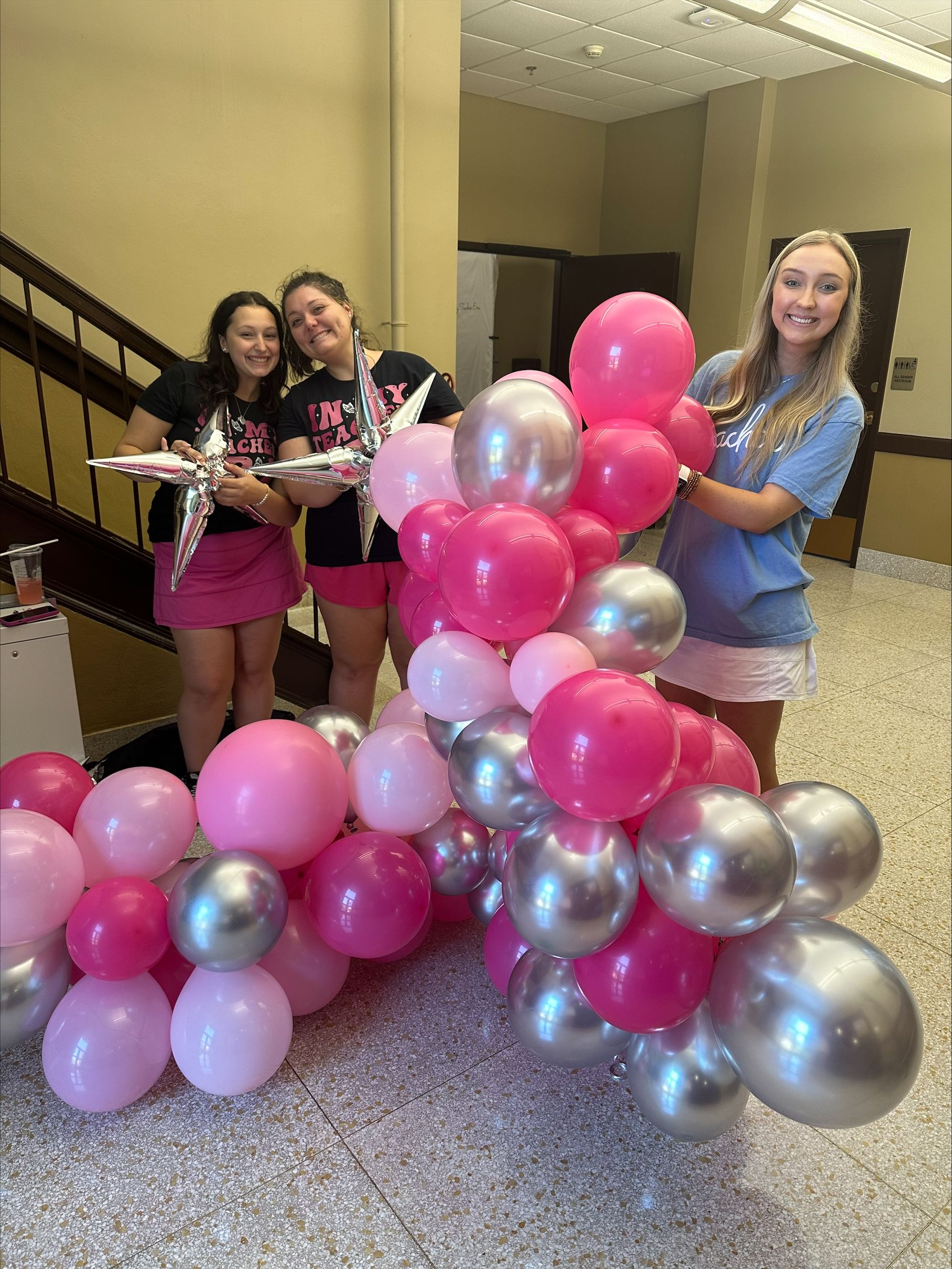

Sr. Associate Dean Burnham (L) and Dean Wilson (R) celebrate the beginning of the year with Big Al and elementary education seniors
Sr. Associate Dean Burnham (L) and Dean Wilson (R) celebrate the beginning of the year with Big Al and elementary education seniors


Dr. Cailin Kerch (L), Big Al, and Dr. Alison Hooper (R) leading seniors in their next to last semester
Dr. Cailin Kerch (L), Big Al, and Dr. Alison Hooper (R) leading seniors in their next to last semester



IN OUR TEACHER ERA
CEE Block 3 ECE pre-internship orientation starts year with a bang
Using the Taylor Swift Eras Tour, a ride that has swept the country this summer, Drs. Kerch and Hooper opened the school year for Block 3 with their pre-internship meeting with that enthusiasm in mind. Big Al joined the class for a pre-party before getting down to the business of what it means to be a senior going into the last year of college and preparing for a career in teaching.
“Anything you put your mind to and add your imagination into
can make your life a lot better and a lot more fun.”
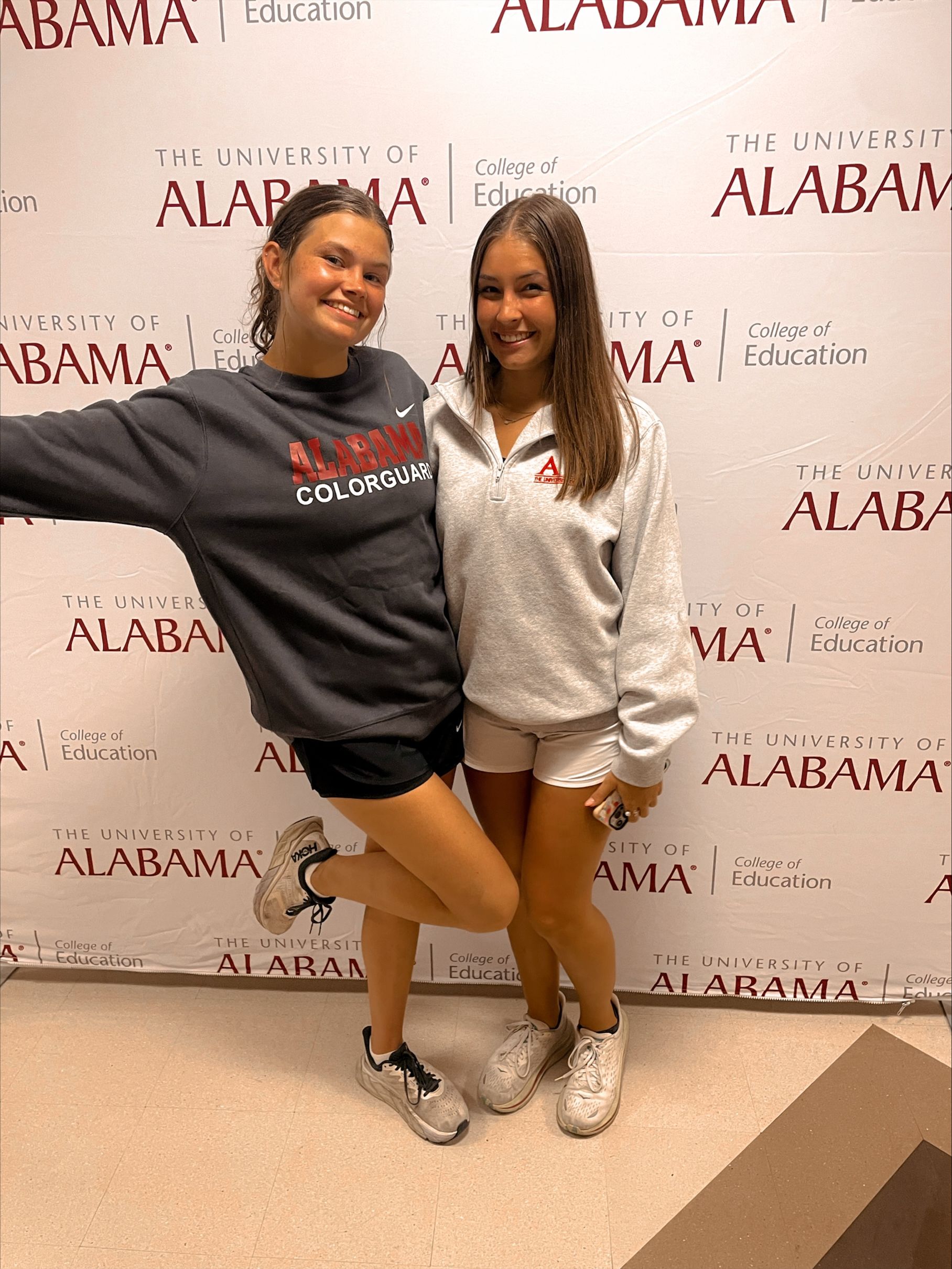
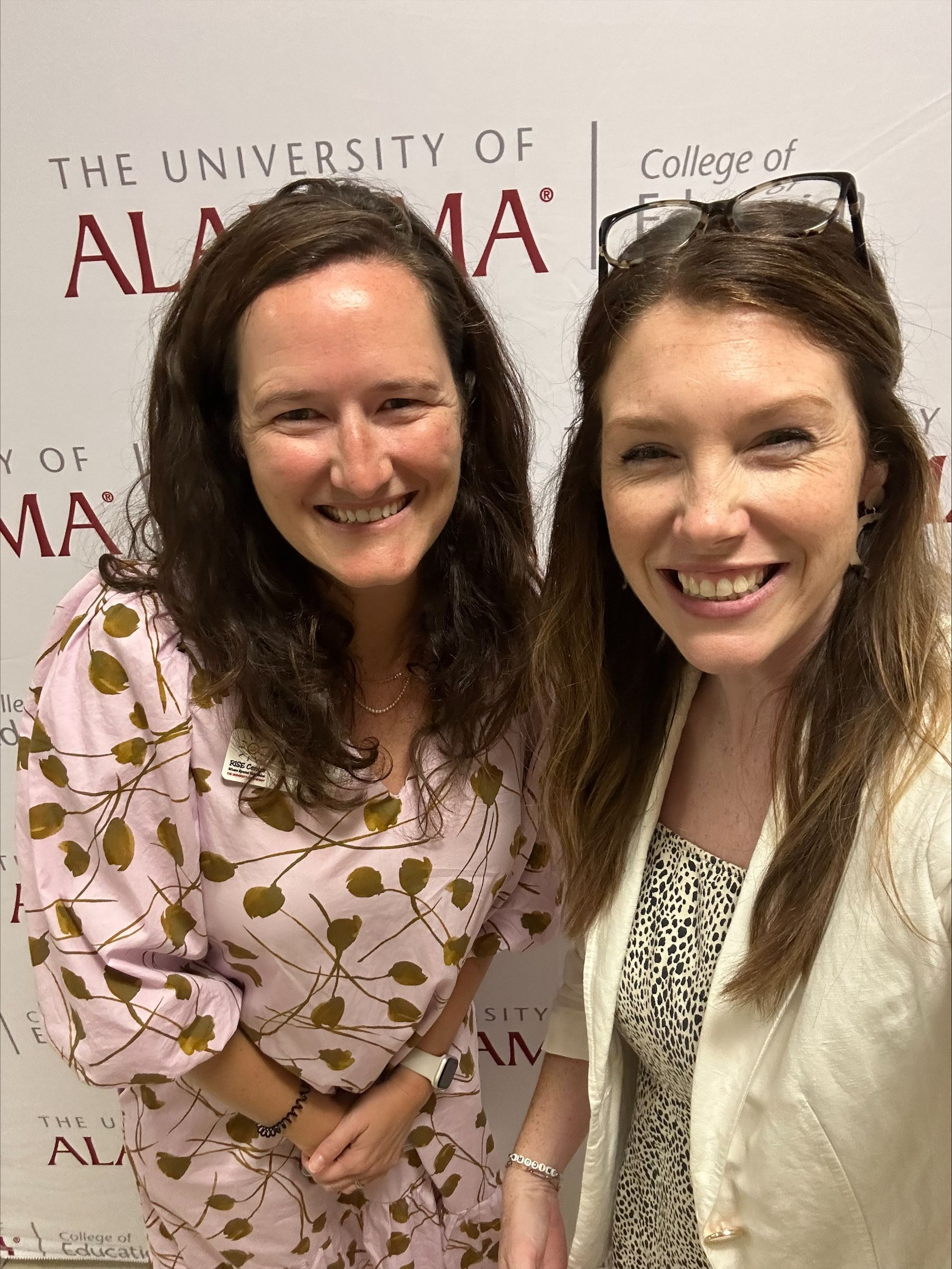
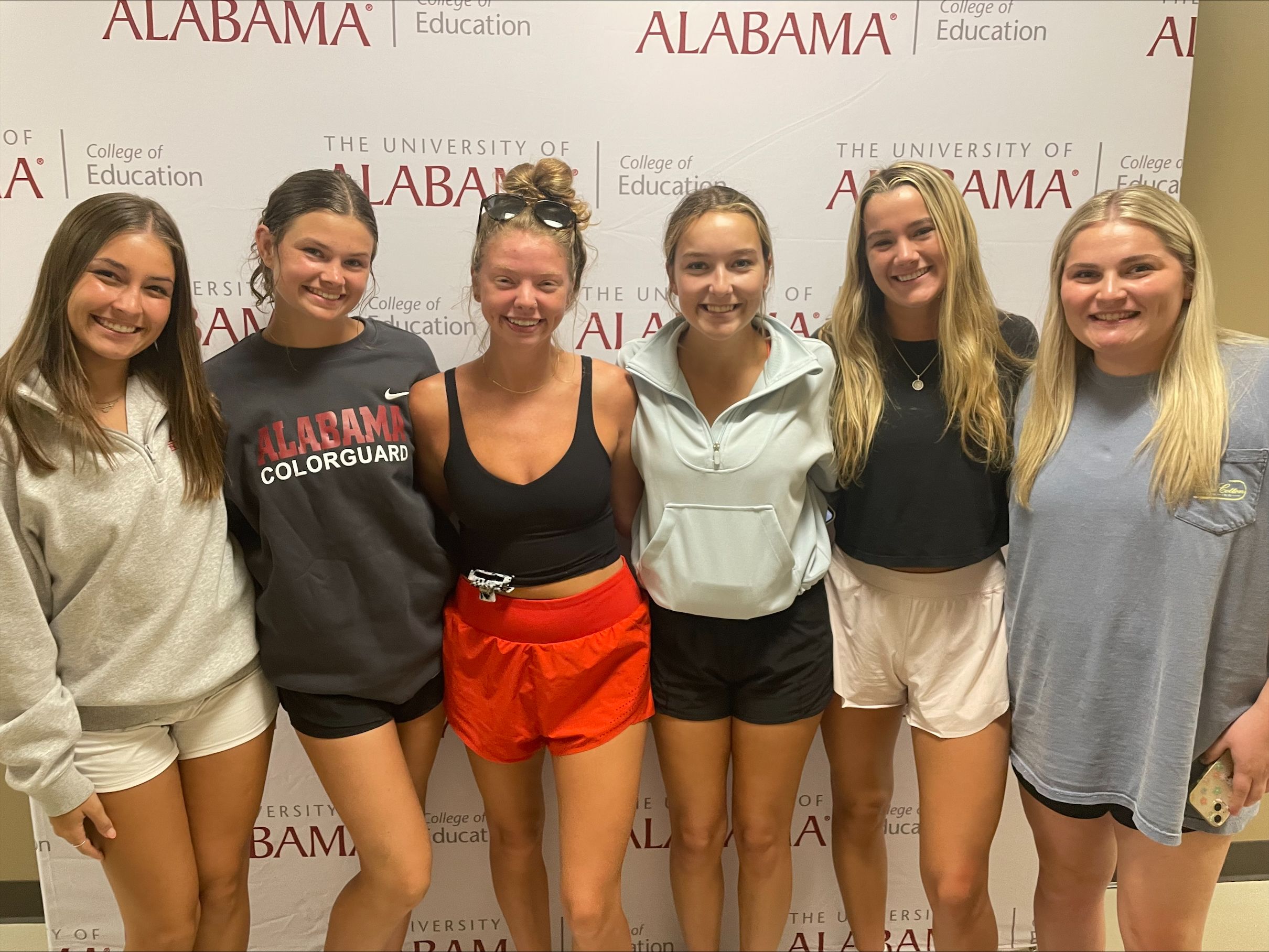
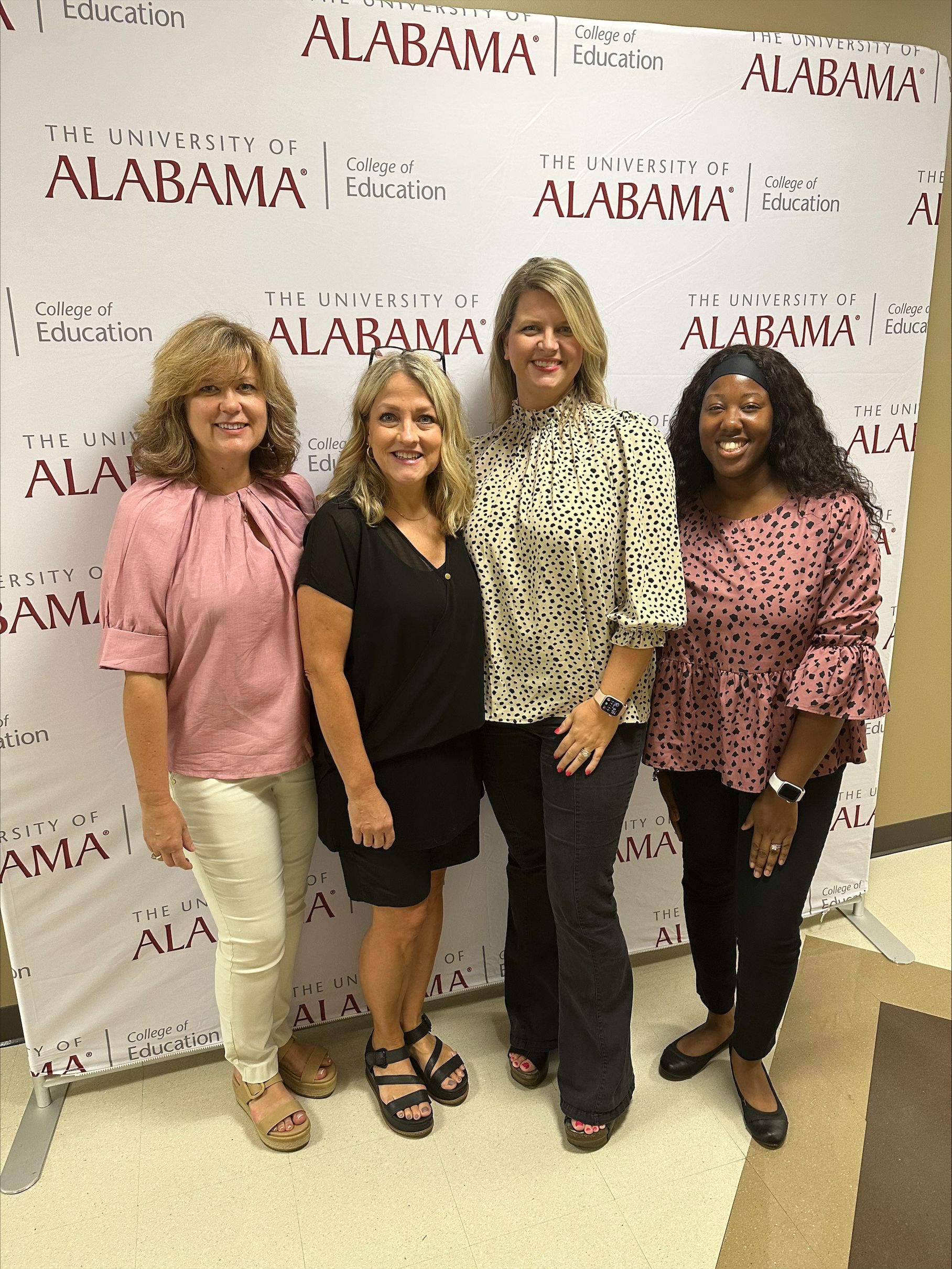
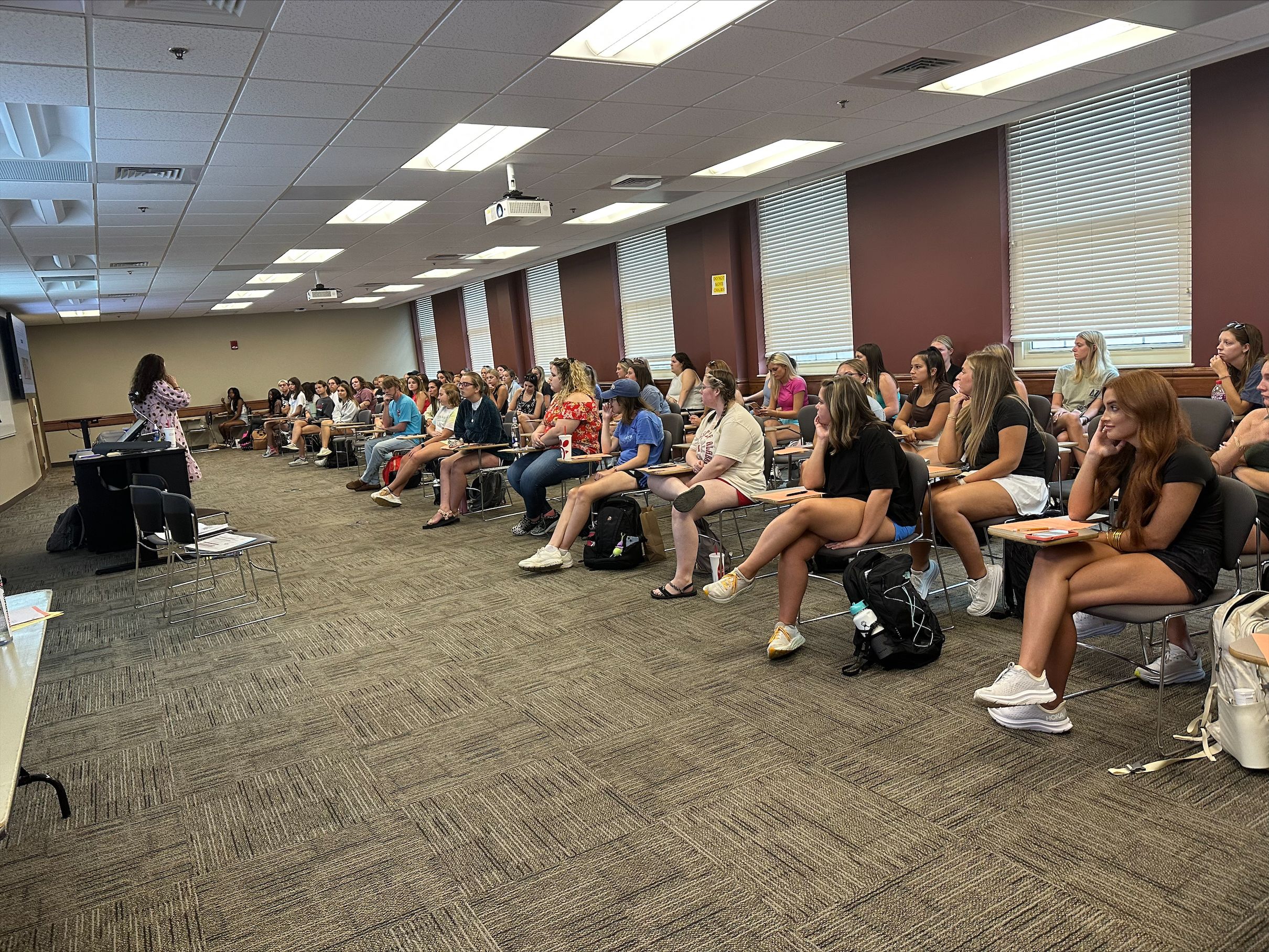





Dr. Emily Lund named 2023 American Psychological Association Fellow
Dr. Emily Lund was recently named a 2023 American Psychological Association Fellow in APA Division 22, rehabilitation psychology.
Dr. Lund is among five applicants in this division who received final approval from the APA Council of Representatives and will be recognized during next year’s APA Convention. Each year, the event welcomes the largest convocation of psychologists in the world.
“It was an honor to know that my peers found my contributions to the field to be worthy of fellow status, especially as an early career researcher, as this is considered a career-long accomplishment similar to a lifetime achievement award,” Lund said. “I was also very appreciative of my mentors who supported me and my colleagues who are Fellows and wrote letters of recommendation on my behalf.”
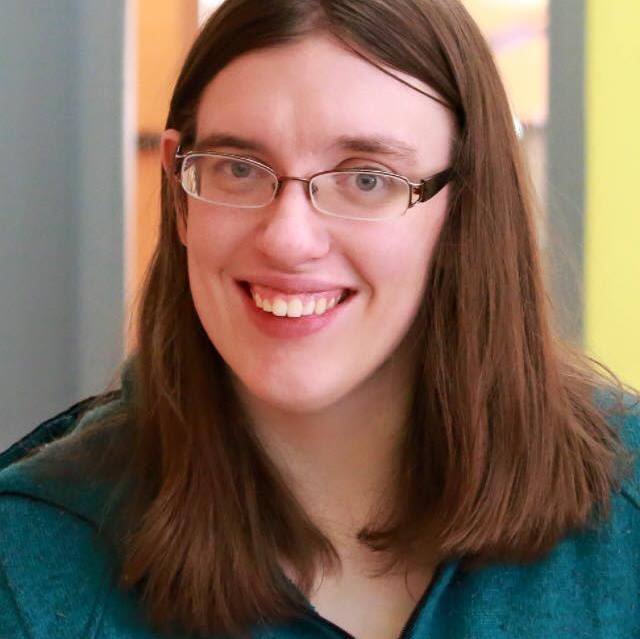
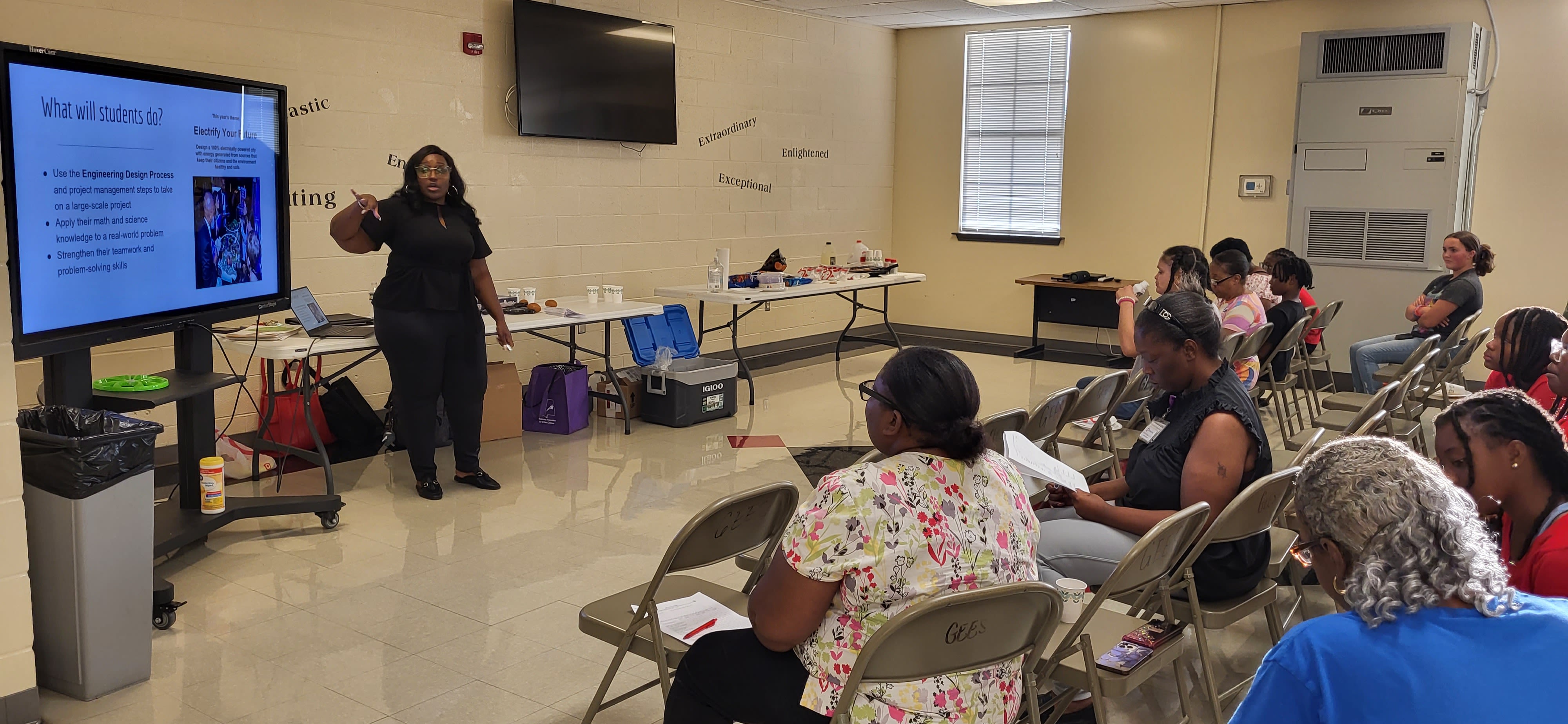
The Alabama Transportation Institute's Dr. Hope Whiteside, who is also a College of Education alumna, speaks about an activity where students will use the engineering design process as well as other skills.
The Alabama Transportation Institute's Dr. Hope Whiteside, who is also a College of Education alumna, speaks about an activity where students will use the engineering design process as well as other skills.
Gulf Research Program grant will help educate middle-school students on water research, treatment in community
The National Academies of Sciences, Engineering, and Medicine’s Gulf Research Program awarded funding this summer to a project that will educate middle-school students on water research and treatment efforts taking place in their community.
The grant, titled “Rural Water Education (RWE) Partnership for Place-Based STEM Learning in Out-of-School Programs,” is led by the Black Belt Community Foundation (BBCF) in partnership with Greensboro Middle School, The University of Alabama, and the Alabama Water Institute.
The team powering the interdisciplinary project includes principal investigator of the grant and BBCF Chief Community Engagement Officer Chris Spencer, BBCF CEO Felecia Lucky; Greensboro Middle School Principal Anthony Sanders and Assistant Principal Myra Harris; as well as the following UA collaborators: Dr. Joni Lakin, Dr. Shannon Davidson, and Dr. Dominic Combs from the College of Education; Dr. Emily Elliott from New College; Dr. Hope Whiteside from the Alabama Transportation Institute; and Dr. Mark Elliott from the College of Engineering.
“We are working with the teachers and administration to create learning opportunities for students to understand some of the issues with water and wastewater and then bring in the advocacy where students can propose solutions to these challenges,” said Dr. Joni Lakin, associate professor of educational research. “That is the big goal.”
Researchers from the University have collaborated with Greensboro Middle School to develop an after-school program that will introduce students to regional water and wastewater research as well as related socio-environmental issues occurring in and around their community. The curriculum will include STEM-based activities while covering a variety of topics, such as where their drinking water comes from, where wastewater goes, what can happen if wastewater treatment goes awry, and more.
“If students get passionate about the subject, they could discover a career ... This is research that they can get excited about and someday contribute to.”
“Greensboro Middle School is excited about being engaged in the Gulf Research Program Grant,” Principal Anthony Sanders said. “This extended learning opportunity will not only benefit our students by introducing them to action research and STEM-related activities, it will also benefit our families who live in Newbern. Improving water quality is paramount to have an improved quality of life.”
One experiment called “Can You Flush It?” will show students which tissue products can clog pipes and back up septic tanks. The activity asks students to put various types of toilet paper, flushable wipes, and other items into containers of water, shake them up, then leave them to sit. After a few days, they will inspect the containers to see which products dissolved and which did not.
The hope is to ignite students’ interest to help make a difference in their community and to get involved in STEM learning. One way of doing this is by working on their own water research projects.
“This is scientific research and engineering development in the students’ own community, which makes it personally relevant and more interesting,” Lakin said.
She said another goal for the program is for the students to be able to present their research projects at the Center for Community-Based Partnerships’ UA STEM Showcase, where they will be judged against the work of other area public and private middle-school students. Not only is it a chance to display their research, but winners also gain the opportunity to participate in the Central Alabama Regional Science and Engineering Fair at The University of Alabama at Birmingham.
Other plans for the program include hosting events where Greensboro Middle students can share what they learned with their families and possibly the broader community, Lakin said.
Youth learning about water research and what can be done to alleviate wastewater issues close to home will not only help the environment in the long run, but the knowledge they gain could influence them to choose career paths in engineering, science, wastewater treatment, and other related fields.
“If these students get passionate about the subject, they could discover a career that makes a difference and keeps them in their community,” Lakin said. “This is research that they can get excited about and someday contribute to.”
UA CALT program opens pathway to becoming a certified dyslexia therapist
When young students experience persistent difficulties with reading, specialized assistance is key in helping them progress and in preventing long-term effects that could hinder their reading abilities. Intervention from certified language therapists can provide the instruction and support necessary to benefit those who struggle with dyslexia and reading difficulties.
According to the International Dyslexia Association, dyslexia affects at least 1 in 5 children, and another 20% or more display characteristics of dyslexia in an educational setting that call for intensive assistance from professionals with expertise in language therapy.
The University of Alabama Reading Support Services, in partnership with the Dyslexia Resource Center, offers a two-year, advanced career development opportunity to help make these types of specialists more abundant and accessible.
The UA Certified Academic Language Therapist program, or UA CALT, puts teachers, speech or language therapists, and other individuals on the pathway to becoming certified dyslexia therapists by providing them with the skills needed to work extensively with students who struggle with dyslexia or other continuing reading difficulties.
“(UA CALT) is the professional development certification for those interested in becoming more expert at teaching children who have persistent reading difficulties,” said Dr. Carol Donovan, program coordinator of UA CALT. “It provides an opportunity to learn more about serving children with specific needs beyond what one might learn in the master’s program for a general elementary-level teacher.”
By training therapists to be experts in language therapy and utilize approaches, such as academic language therapy, multisensory structured language education, and other techniques, UA CALT serves to “help teachers become thoughtful about what their students need and (shows them) how to provide the explicit instruction … and not just learn how to teach one program,” Dr. Donovan said.
UA CALT would be beneficial to anyone whose goal is to be more adept in reading intervention, she added. She herself is training to be a certified dyslexia therapist as a member of Cohort 1.
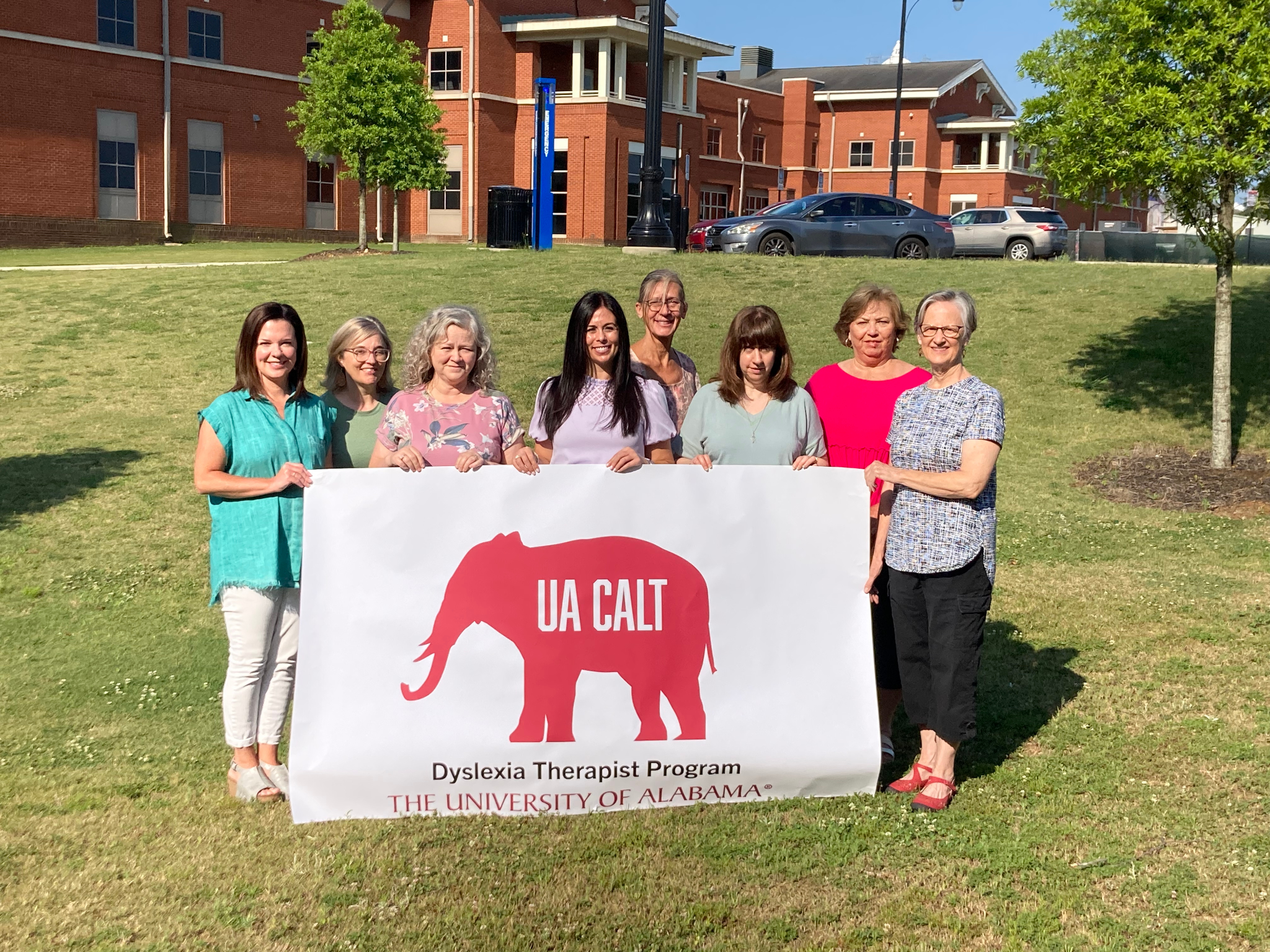
For more information on UA CALT, please visit uacalt.ua.edu
or email Dr. Carol Donovan at cdonovan@ua.edu.
Prospective UA CALT members are asked to already have or be working toward earning their master’s degree. Individuals are required to complete two years of coursework and earn 700 on-site practicum hours, with 10 lessons observed by a qualified instructor, within five years of beginning the program to be considered at the therapist level. Those 700 hours must be spent teaching students of multiple reading levels – therefore students might range from elementary school to high school ages – and the time must be documented and approved. Once all of this is completed, program members can earn their certification by taking and passing the Academic Language Therapy Association Certification Exam.
The Alabama State Department of Education recognizes the expertise that accompanies completing the program, Dr. Donovan said.
“Some districts are supporting teachers and interventionists to come to the program,” as they are in dire need of more expertise in this area, she added.
As part of the Alabama Scottish Rite Foundation’s mission to support children within the state, it has supported UA CALT by providing scholarship opportunities to Cohort 1 and 2 members, serving to assist in the specialized training and certification of academic language therapists.
“(Being a dyslexia therapist) is about having the expertise to analyze assessments and determine where the strengths and weaknesses are so you can best serve the individuals you are working with,” Dr. Donovan said.
UA CALT is currently in Cohort 2, with Cohort 3 beginning in summer 2024. Program applications for Cohort 3 will be available in October and remain open until the cohort is filled.
McLure Library under renovation
McLure Library will be closed for the foreseeable future as the nearly 100-year-old building undergoes a major transformation to better serve the College of Education, School of Library and Information Studies and campus community. Renovation plans call for significant upgrades to the building’s infrastructure including new mechanical, electrical, accessibility, life safety systems, technology and building envelope issues including new windows. The addition will also provide space for code required vertical circulation and an elevator, as the building does not currently have one. ADA access to McLure will be improved through the construction of a new entrance structure, which will also house program space below. Adjacent to the new entry will be a plaza and gathering space designed with brick pavers, precast seat walls, new landscaping, and site lighting.
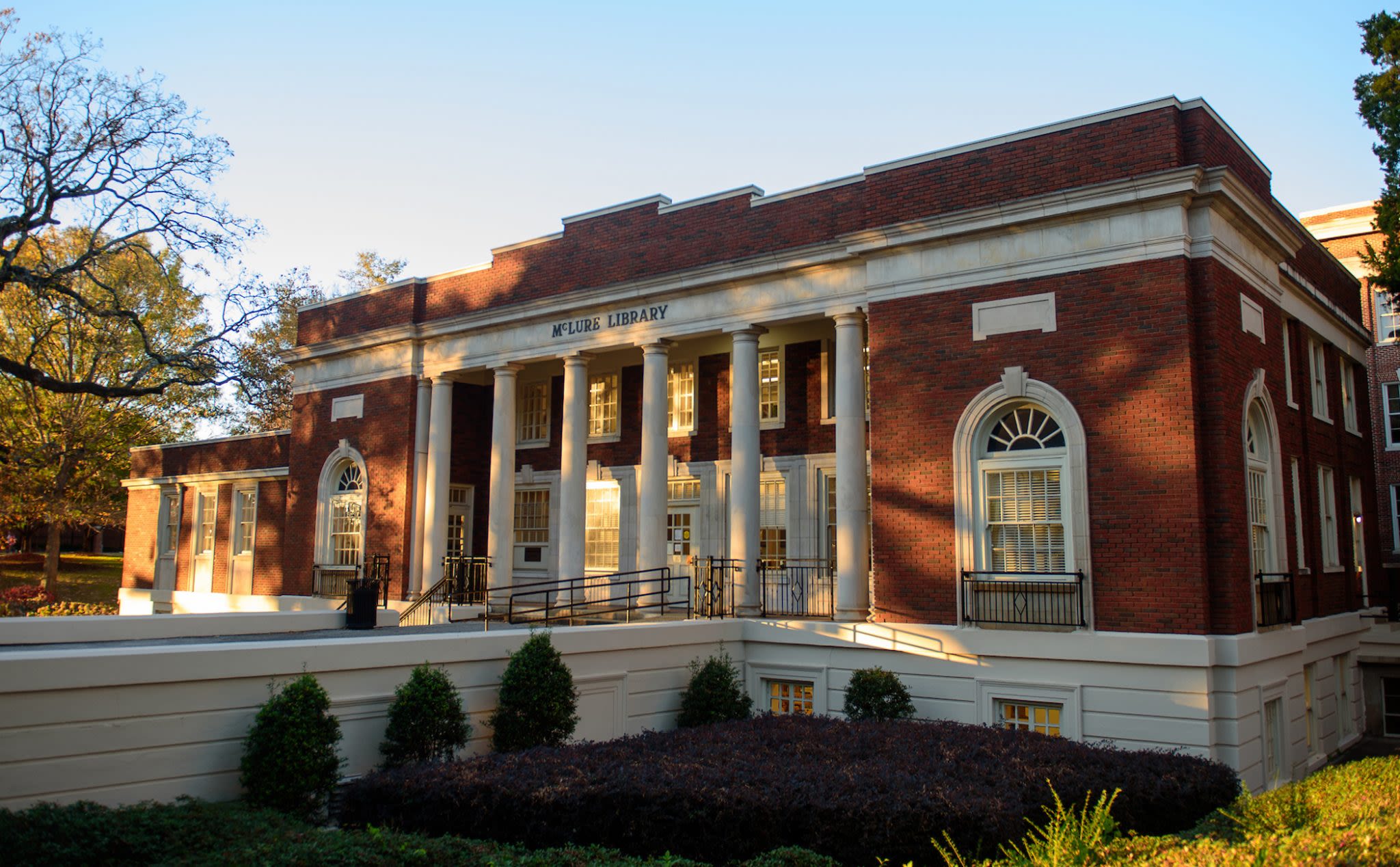
Business partners receive grant funding, host first LEADing Well conference
On Aug. 5, Demitrius Barksdale and Nate Owens hosted their first LEADingWell: Holistic Health and Wellness Conference at Coastal Alabama Community College’s Brewton Campus. This summer, the pair received grant funding from the Alabama Entrepreneur Institute and the Gandhi-King Scholarly Exchange Initiative to fund their business plan and community education initiatives.
Barksdale and Owens co-founded LEADingWell in 2022. Their Christian faith-based organization is designed to resource community members and leaders to fulfill their life purpose through holistic health and wellness. LEADingWell focuses on health awareness, health education, community resources, and community partnership.
Over 50 participants attended the conference, which featured health and wellness professionals who provided education and resources from various sectors. These included mental and emotional health, medical health, which involved a diabetes discussion; financial wellness, such as saving, budgeting, and retirement planning; and a physical wellness panel discussion.
Barksdale is an assistant director in the Culverhouse College of Business, adjunct instructor, and doctoral candidate in the Executive Higher Education Program at The University of Alabama. His dissertation focuses on higher education's role in holistic student development. He is passionate about human development, holistic health and wellness, and societal impact.
Owens works in the Youth Services Institute at The University of Alabama and is in the accelerated master’s program for Public Health through the College of Human Environmental Sciences. He is a former personal trainer at the University Recreation Center and Tru-Fit in Northport and is a LEAD intern for the fall. Owens will graduate from UA in December. He is passionate about health and wellness and is a public health advocate.
Barksdale and Owens would like to thank Coastal Alabama Community College for hosting and providing a welcoming environment for their organization, team, and community. Their next LEADingWell event is scheduled for early December. Details will be provided at a later date.
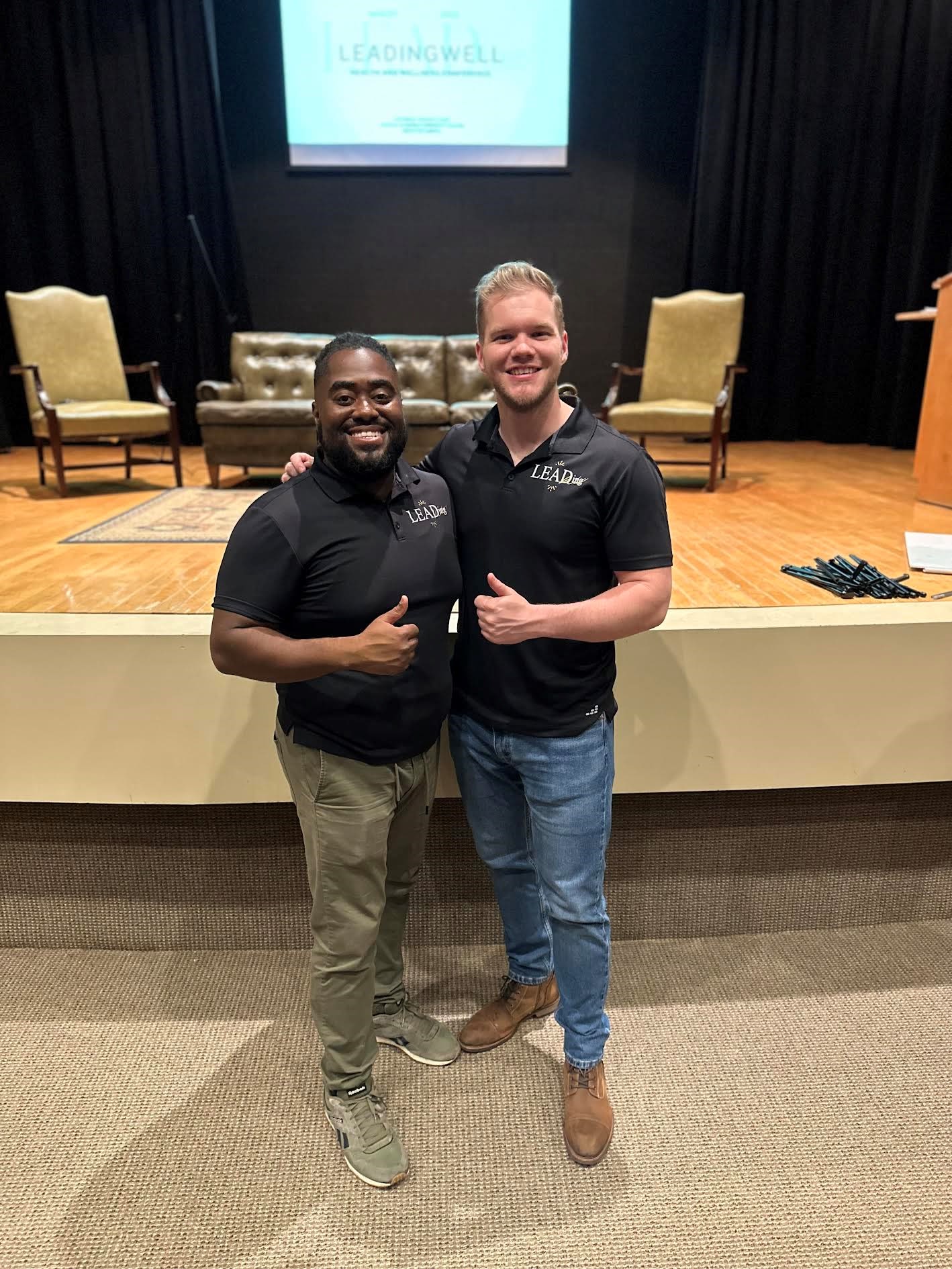
Demitrius T. Barksdale and Nate Owens, co-founders of LEADingWell
Demitrius T. Barksdale and Nate Owens, co-founders of LEADingWell
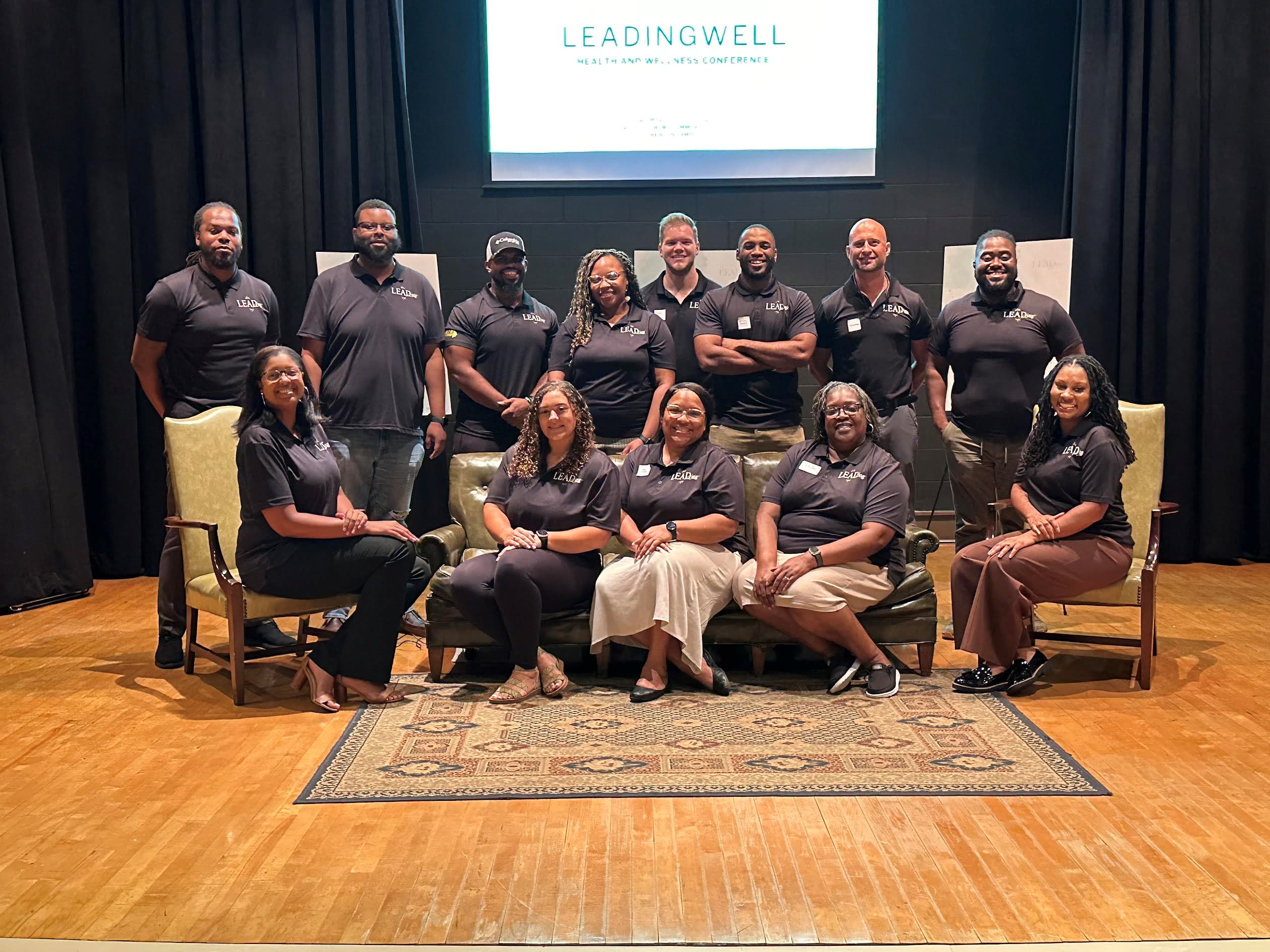
A group photo from the LEADingWell: Holistic Health and Wellness Conference this summer
A group photo from the LEADingWell: Holistic Health and Wellness Conference this summer
Ordering personalized bricks for Autherine Lucy Hall Walkway
By purchasing a brick to be personalized and placed in the Autherine Lucy Hall Walkway, you can help someone special in your life leave a lasting mark at the Capstone. Whether congratulating a new graduate, commemorating a loved one, or honoring a mentor, this meaningful gesture is one they are sure to appreciate.
Each brick is laser-engraved then placed into the walkway located at the front of Autherine Lucy Hall. The personalized bricks in the walkway are arranged with the oldest being closest to the building, making it easier to spot the one you purchased.
Guidelines do apply to the text-only inscriptions on the bricks. Visit education.ua.edu/bricks for those guidelines, a brick order form, or additional information.
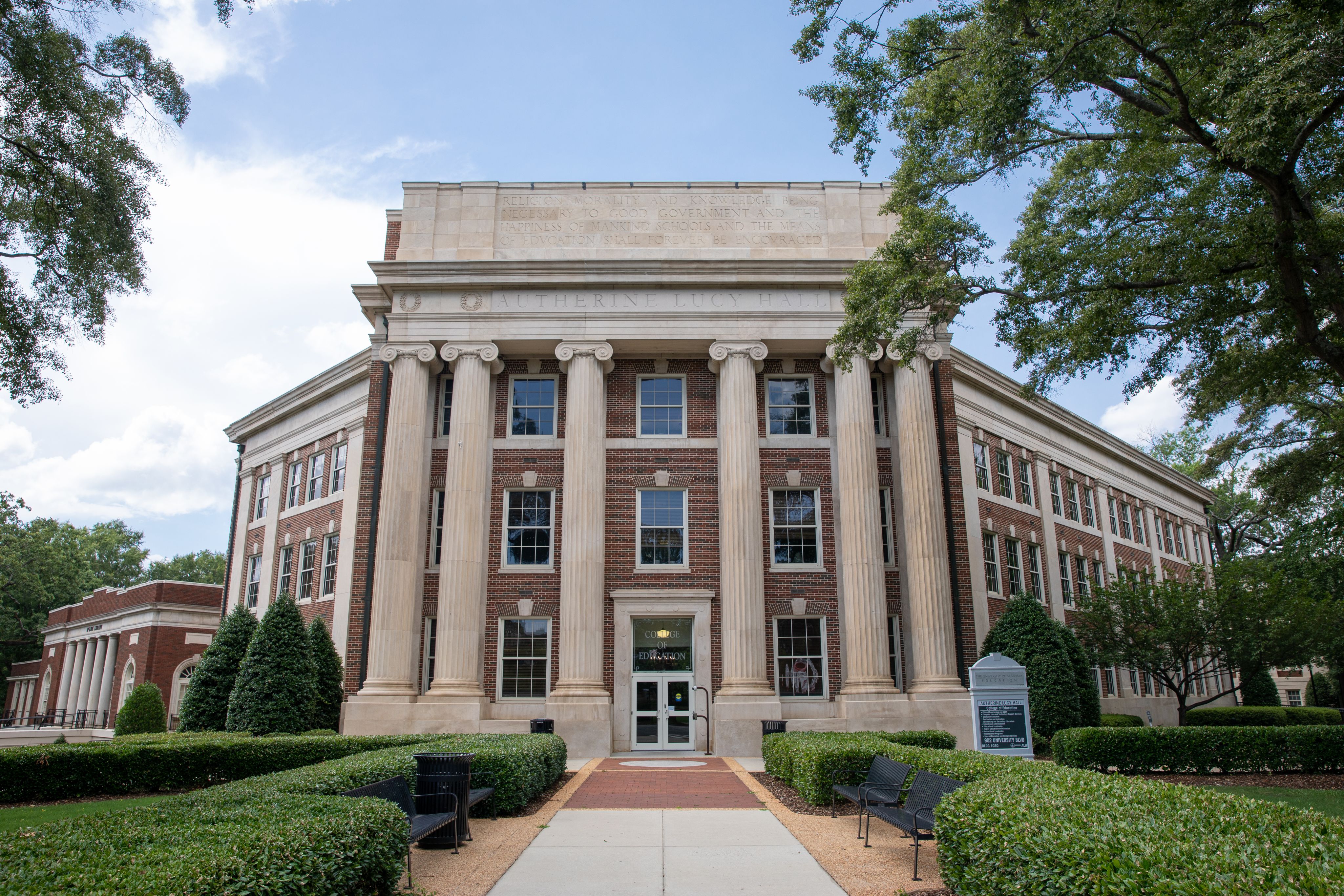
Upcoming Events

SEPT. 23
Alabama vs. Ole Miss
The Crimson Tide will face off against the Rebels in Bryant-Denny Stadium at 2:30 p.m.

OCT. 13-14
Homecoming 2023
Friday, Oct. 13, 4 p.m. College of Education Alumni Awards and Top Alumni Under 40 Awards Presentation and Reception
Saturday, Oct. 14, TBD Tailgate Under the Tent
Student Deadlines
OCT. 6
Degree application deadline
Last day for graduate and undergraduate students to submit a degree application through myBama. Only after petition and approval by the student's college will an application be accepted after the published deadline. If approved, the student will be assessed a $25 non-refundable late fee in addition to the degree application fee.
OCT. 26-27
Mid-semester study break
Classes dismissed, UA offices open.
OCT. 30
Spring 2024 registration begins
Time assignments for registering will be available Oct. 1.

DEC. 16
Fall commencement
Ceremony times for each college will be announced once applications for fall graduation has closed. Visit commencement.ua.edu for additional information.
